24+ Years Experience
Specialist Epoxy Resin Flooring

Enquire Today For A Free No Obligation Quote
Understanding the Importance of Surface Preparation
Surface preparation plays a crucial role in the successful installation of epoxy resin flooring. Properly preparing the surface is necessary to ensure a durable and long-lasting finish. Without adequate surface preparation, the epoxy resin may not bond correctly, leading to issues such as delamination or premature wear.
Why is Surface Preparation Necessary for Epoxy Resin Flooring?
Surface preparation is essential for several reasons. Firstly, it helps to remove any existing contaminants, such as dirt, dust, grease, or oil, which can hinder the adhesion of the epoxy resin. By thoroughly cleaning the surface, you create a clean and smooth substrate for the resin to adhere to.
Surface preparation allows for the identification and repair of any cracks, holes, or imperfections in the substrate. These flaws, if left untreated, can compromise the integrity of the epoxy resin flooring and lead to issues in the future.
Furthermore, surface preparation helps to ensure proper moisture levels in the substrate. Excessive moisture can cause the epoxy resin to bubble or peel, resulting in failure of the flooring system. By assessing and addressing moisture issues during the preparation stage, you can mitigate potential problems and ensure a successful installation.
Proper surface preparation is essential for a successful installation of epoxy resin flooring. By recognising the significance of surface preparation, you can guarantee a durable and long-lasting finish. Here are the key steps to follow:
Remember, taking the time to appropriately prepare the surface will significantly enhance the performance and longevity of your epoxy resin flooring. Do not rush through this critical step; the effort is worthwhile in the long run.
Surface preparation is essential for epoxy resin flooring installations. It ensures proper adhesion, durability, and a successful outcome. Without adequate surface preparation, the epoxy coating may fail to bond with the substrate, leading to issues such as peeling, blistering, or delamination. Surface preparation involves steps such as clearing and cleaning the surface, repairing cracks and imperfections, ensuring proper moisture levels, removing existing coatings or paint, and abrading or grinding the surface. These steps create a clean, roughened surface that allows the epoxy to adhere effectively. By investing time in surface preparation, you can avoid costly and time-consuming repairs in the future.
A step-by-step guide to preparing your surface for epoxy resin flooring installation is essential for achieving a durable and flawless finish. This guide will take you through the necessary tasks involved in this process. It includes clearing and cleaning the surface, repairing cracks and imperfections, ensuring adequate moisture levels, removing existing coatings or paint, abrading or grinding the surface, and finally, vacuuming and cleaning it again. Each sub-section will cover the necessary actions required to create the ideal foundation for your epoxy resin flooring.
Cleaning the surface is the first step in preparing it for epoxy resin flooring installation. Follow these steps to ensure a clean and ready surface:
Suggestions for effective surface cleaning include using a stiff brush or pressure washer for stubborn stains and using a degreaser for oily areas. Ensure that the surface is completely clean and dry before proceeding to the next step for a successful epoxy resin flooring installation.
Inspect the surface for any cracks, chips, or imperfections that require repair. Use epoxy filler or patching compound to fill in the cracks and smooth out the surface. Follow the manufacturer’s instructions for mixing and applying the filler. Allow the filler to dry and cure completely before proceeding to the next step. Sand down the filled areas to create a smooth and even surface. Clean the sanded areas to remove any dust or debris.
To achieve a successful epoxy resin flooring installation, it is vital to manage moisture levels properly during the surface preparation process. Here are the steps to ensure proper moisture levels:
By following these steps, you can ensure that the substrate has the right moisture levels and reduce the risk of adhesion issues, resulting in a durable and long-lasting epoxy resin flooring.
To properly prepare the surface for epoxy resin flooring installation, it is important to follow step 4, which involves removing existing coatings or paint. This step is crucial as it ensures proper adhesion and a seamless finish. Here is a step-by-step guide to help you with this process:
By following these steps, you can effectively remove existing coatings or paint and create an ideal surface for epoxy resin flooring installation. It is important to always prioritise safety and wear appropriate protective gear during the process.
To achieve a successful epoxy resin flooring installation, it is crucial to abrade or grind the surface. This step ensures proper adhesion between the epoxy resin and the substrate. Here is a step-by-step process for abrading or grinding the surface:
The process of abrading or grinding surfaces for flooring preparation dates back centuries and was initially used to create rough textures for better material adhesion. Ancient civilizations used various tools such as stones and sand to grind surfaces. This early technique laid the foundation for modern abrading and grinding methods used in epoxy resin flooring installations today.
Step 6: Vacuuming and Cleaning the Surface Again
After abrading or grinding the surface, it is crucial to thoroughly clean and vacuum the area to remove any dust, debris, and loose particles. This step ensures that the surface is completely free from any contaminants that could affect the adhesion of the epoxy resin. A clean surface will also result in a smoother and more professional-looking finish.
The practice of thorough surface cleaning and preparation dates back centuries. For instance, ancient Egyptian artisans meticulously cleaned and smoothed surfaces before applying paint or decorative finishes to ensure the best possible results. This attention to detail in surface preparation has been passed down through generations and continues to be a vital step in various applications, including epoxy resin flooring.
Common Mistakes to Avoid during Surface Preparation
Floor preparation is crucial for epoxy resin flooring installation because it ensures the proper adhesion of the epoxy to the substrate. Without proper preparation, the flooring can crack, delaminate, or fail to adhere properly.
Some important steps involved in floor preparation for epoxy resin flooring include cleaning the floor, checking the state of the concrete, testing for water vapor transmission, leveling the surface, and patching any holes or cracks in the concrete. These steps ensure a smooth and even installation.
The recommended floor preparation methods for epoxy resin flooring include diamond grinding and shot blasting. Diamond grinding uses state-of-the-art machinery to mechanically clean the surface and provide a smooth and even finish. Shot blasting uses abrasive steel ball bearings to etch away contaminants and prepare the surface for epoxy application.
To ensure the longevity of epoxy floors, it is important to properly prepare the floor before installation. This includes repairing any cracks or imperfections, ensuring the substrate is structurally sound, and using appropriate products for patching. Additionally, regular cleaning and maintenance can help protect the epoxy floors from wear and tear.
Yes, epoxy resin flooring can be installed over various surfaces such as concrete, wood, linoleum, or ceramic tile. However, each surface requires specific preparation methods to ensure proper adhesion and a high-quality finish. The state of the surface and its compatibility with epoxy must be taken into consideration during the preparation process.
Yes, testing for moisture levels is important before installing epoxy resin flooring. Excessive moisture can negatively impact the adhesion of the epoxy and lead to problems such as peeling or cracking. By testing for water vapor transmission, you can ensure that the substrate is suitable for epoxy application and that the final result will be aesthetically pleasing and durable.
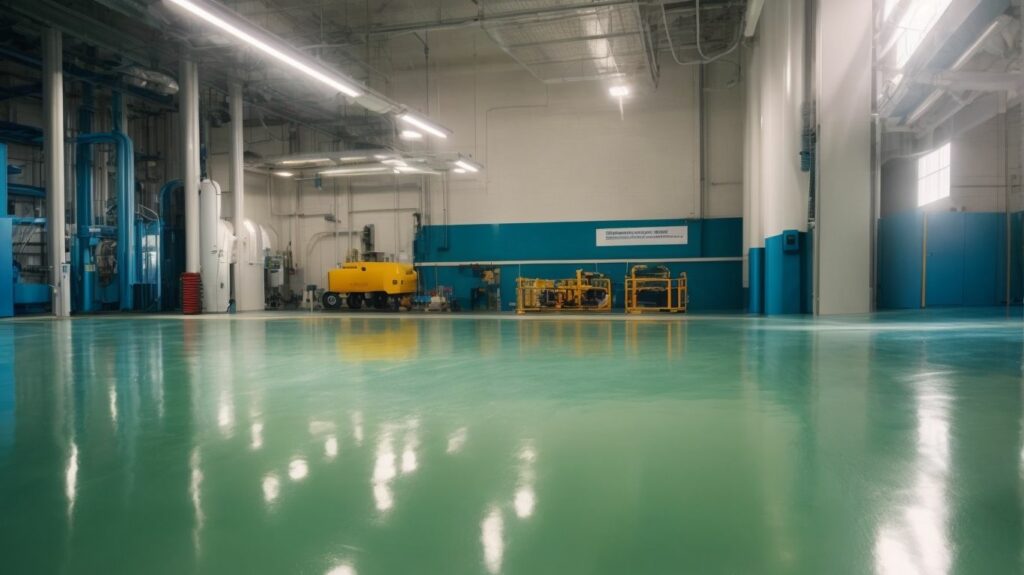
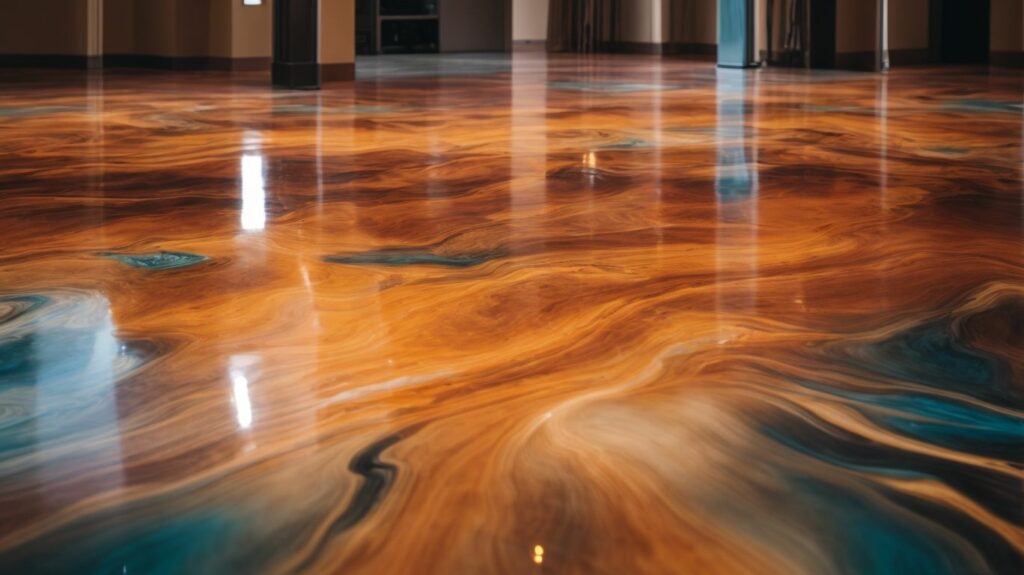
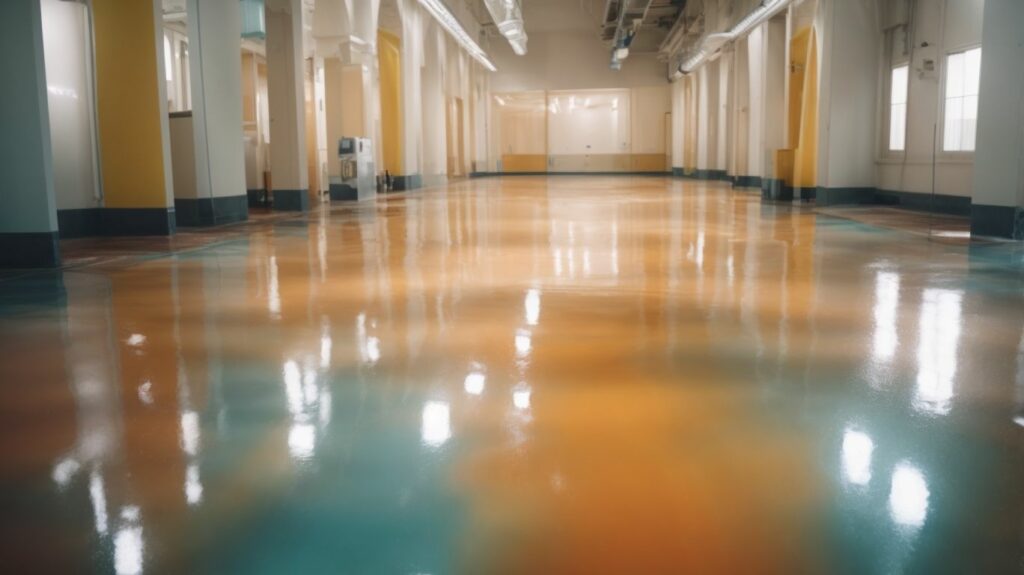


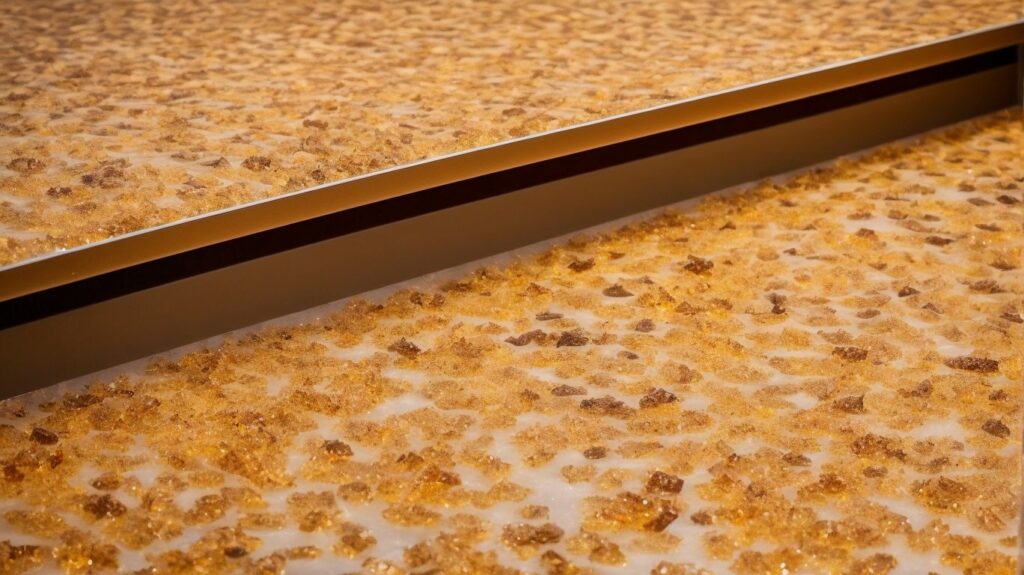
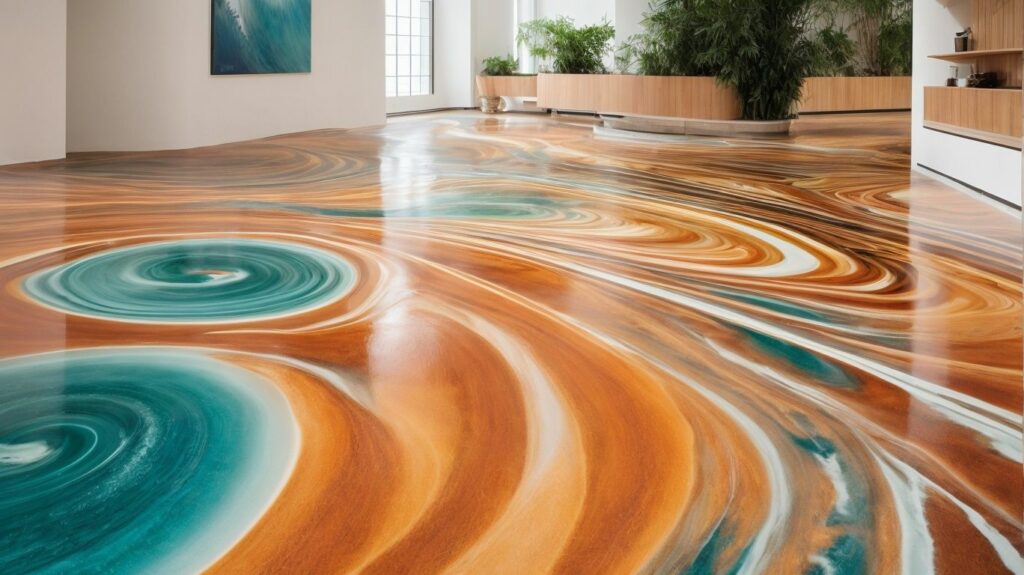
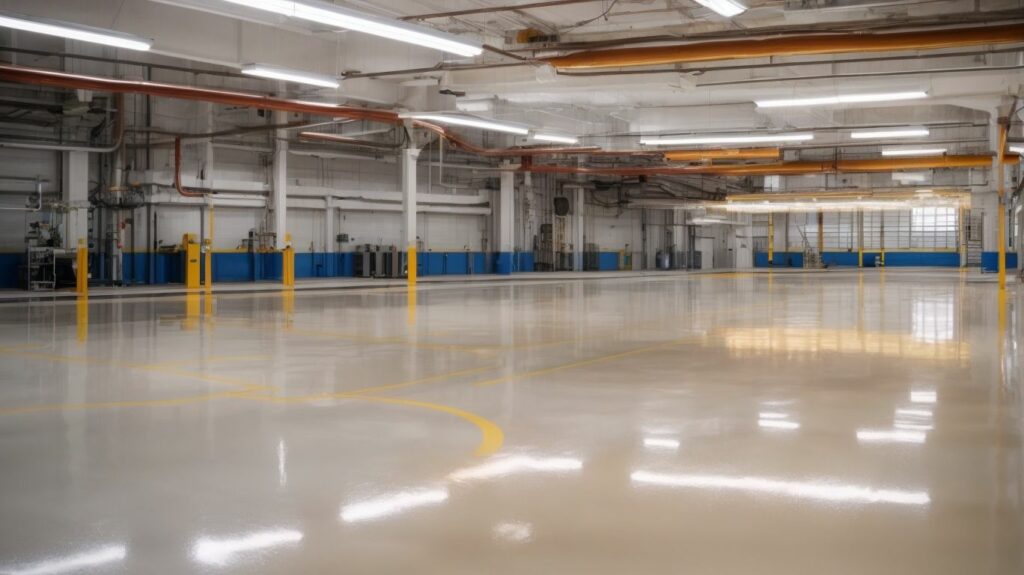
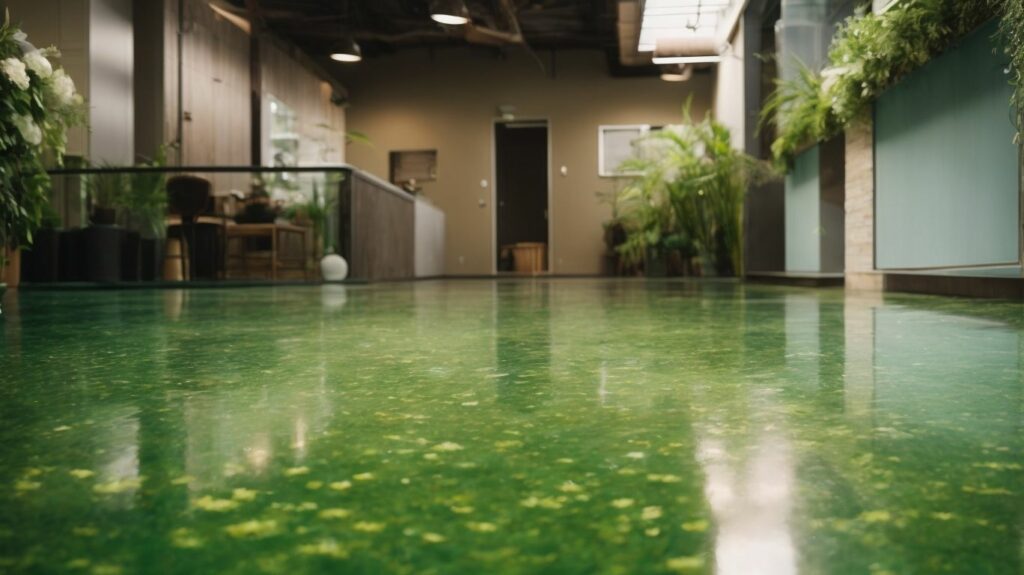

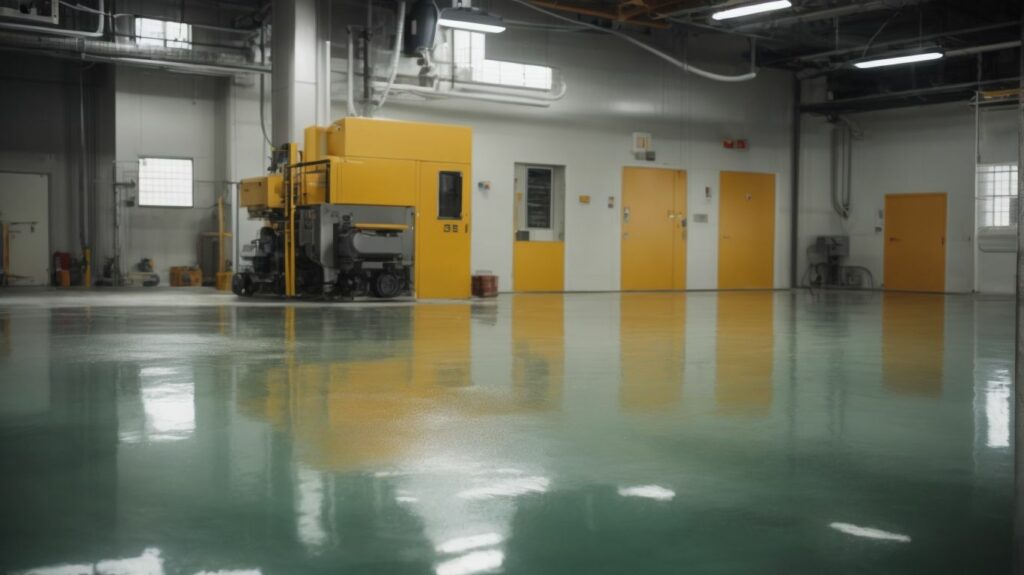
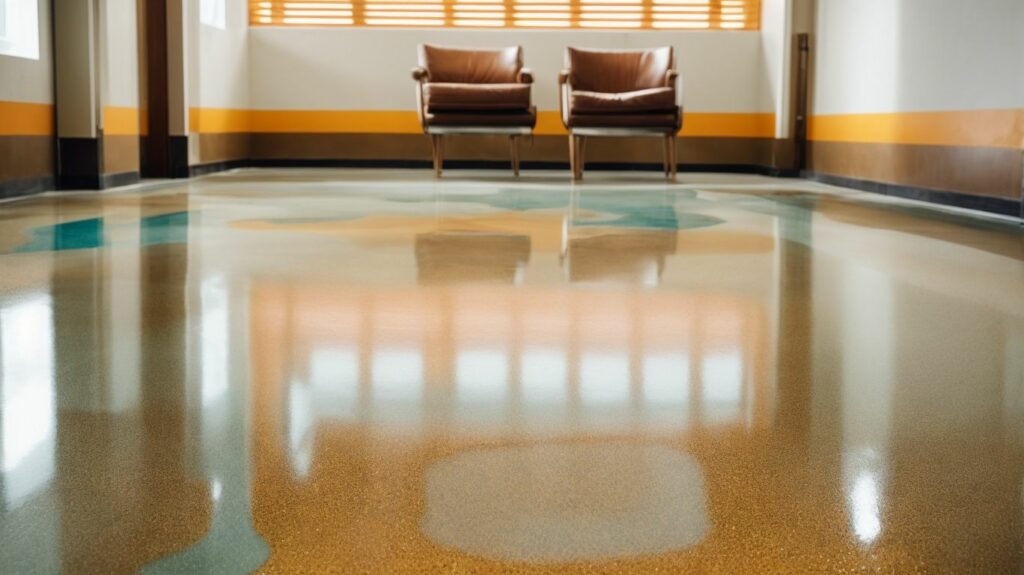
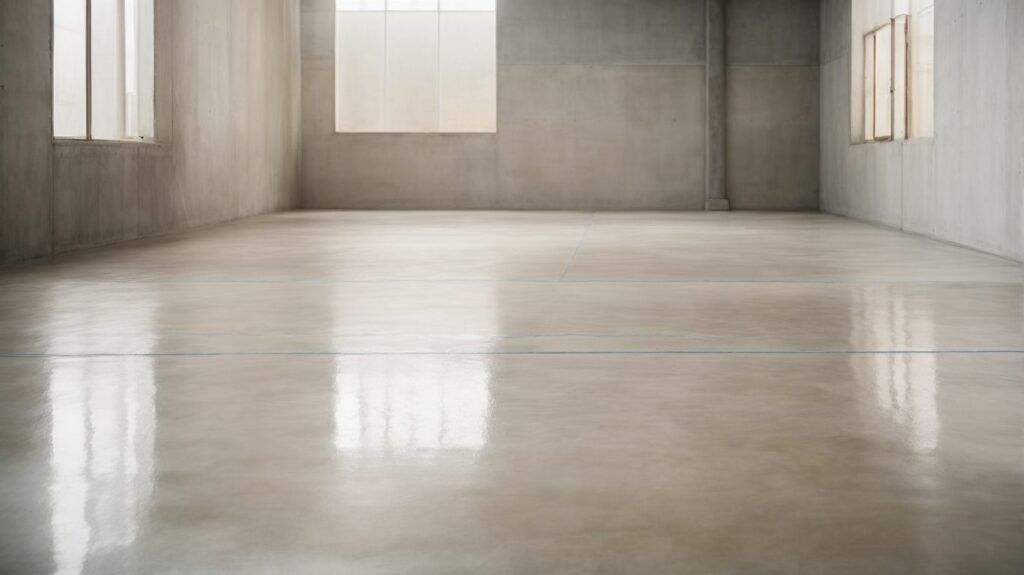


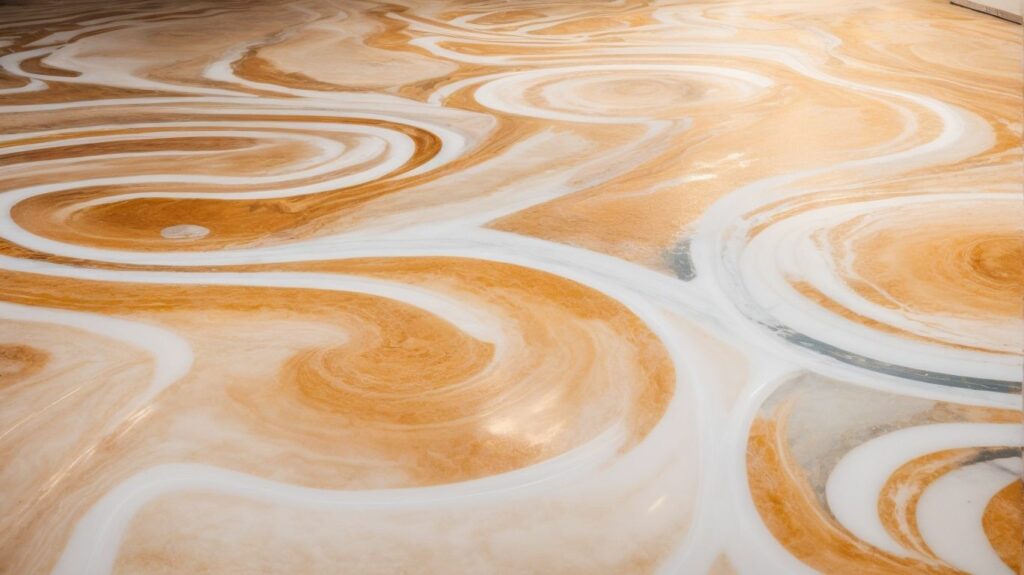

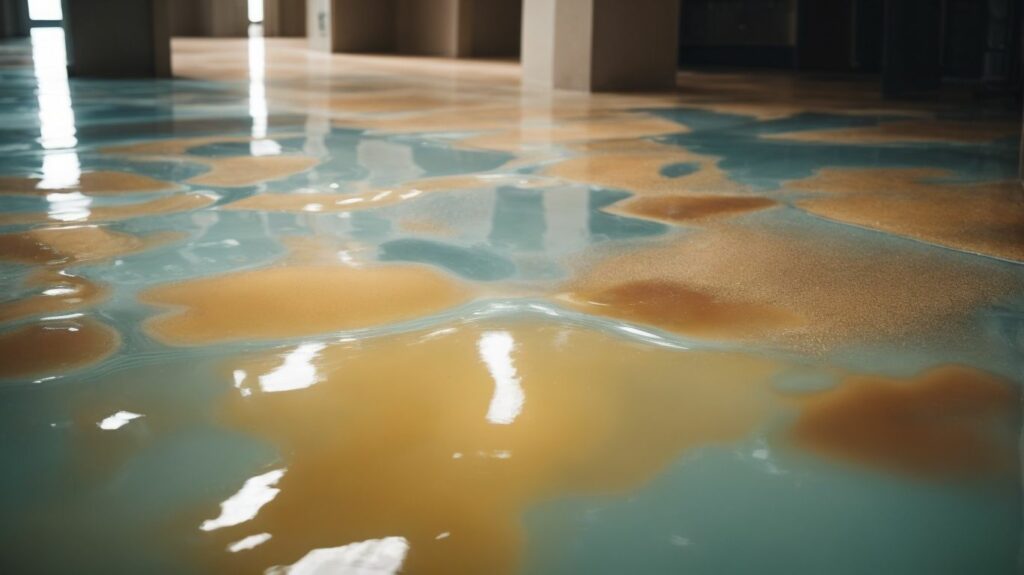
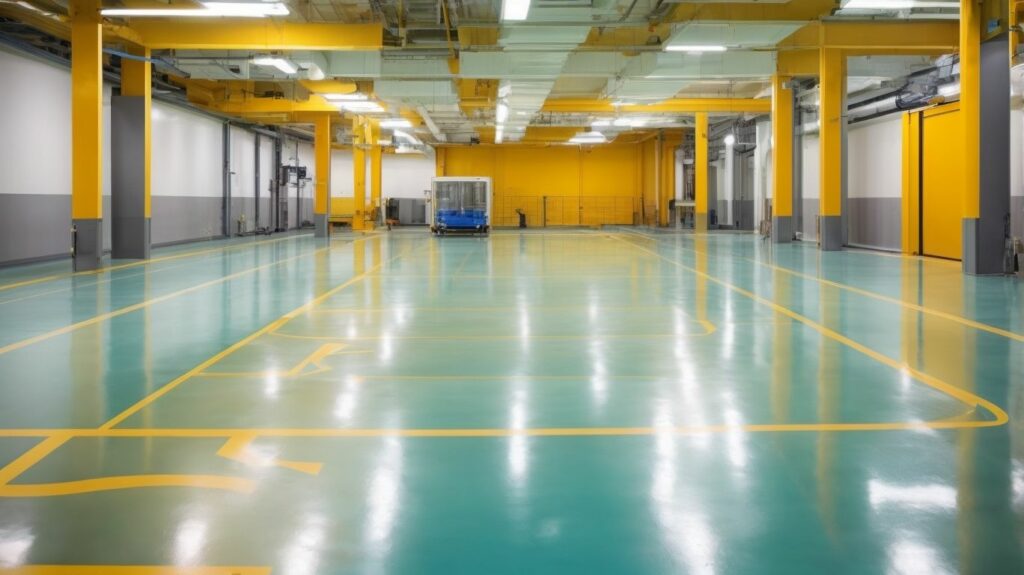
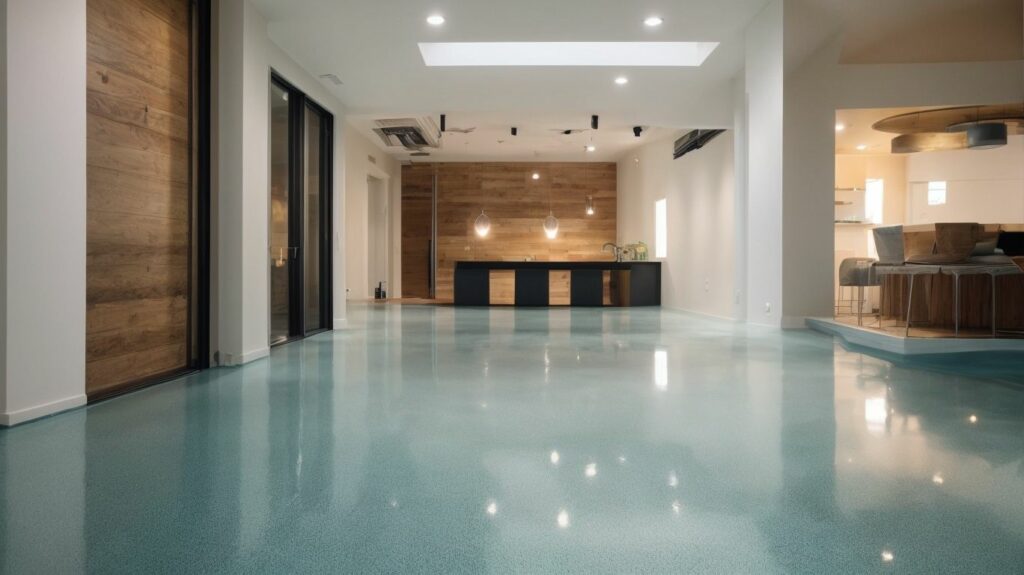

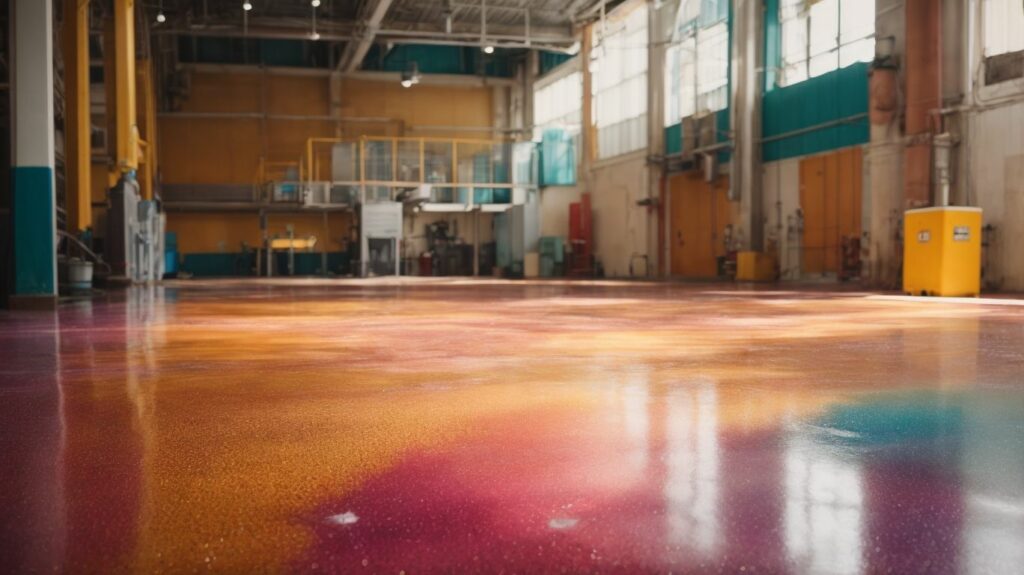
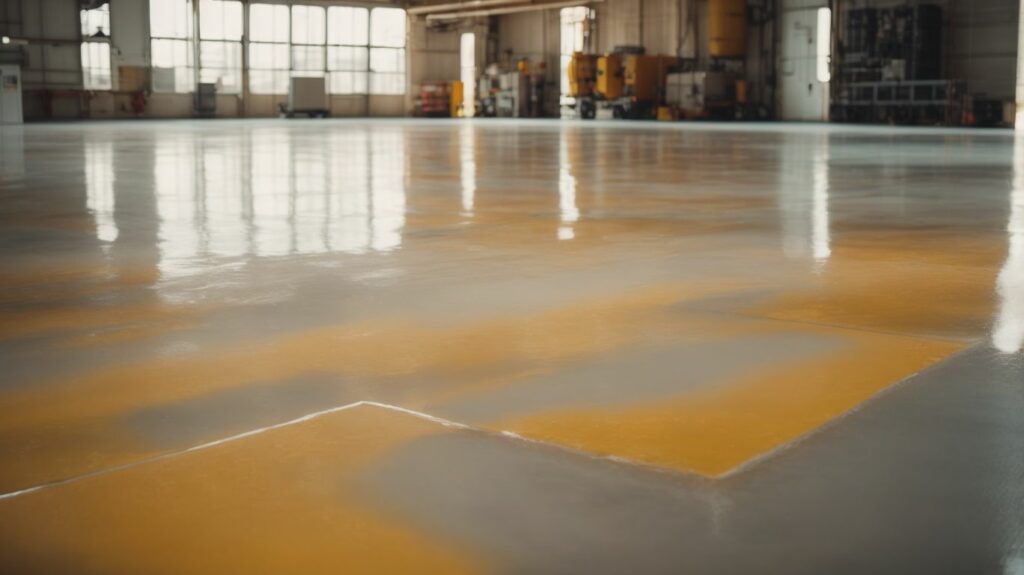
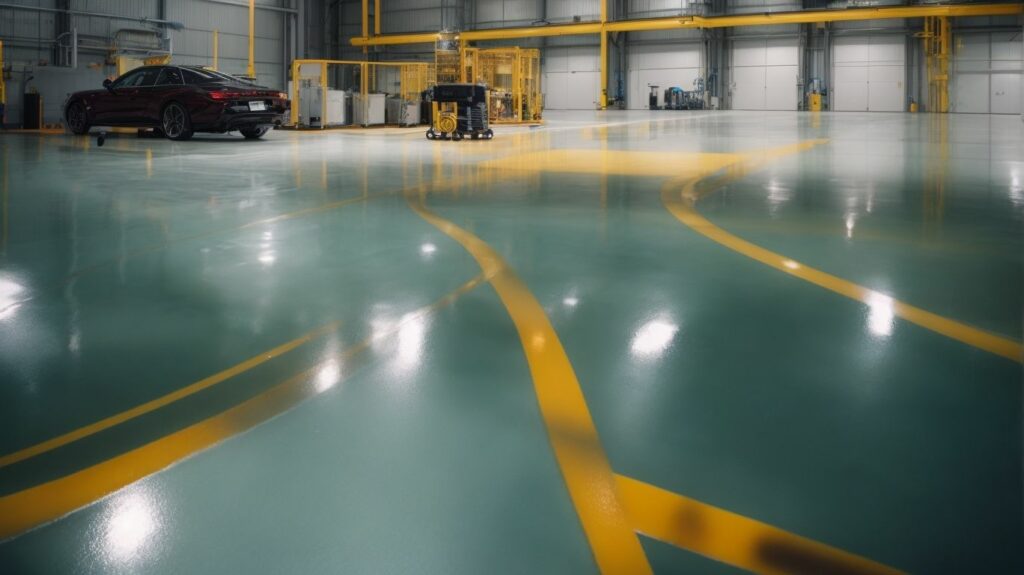

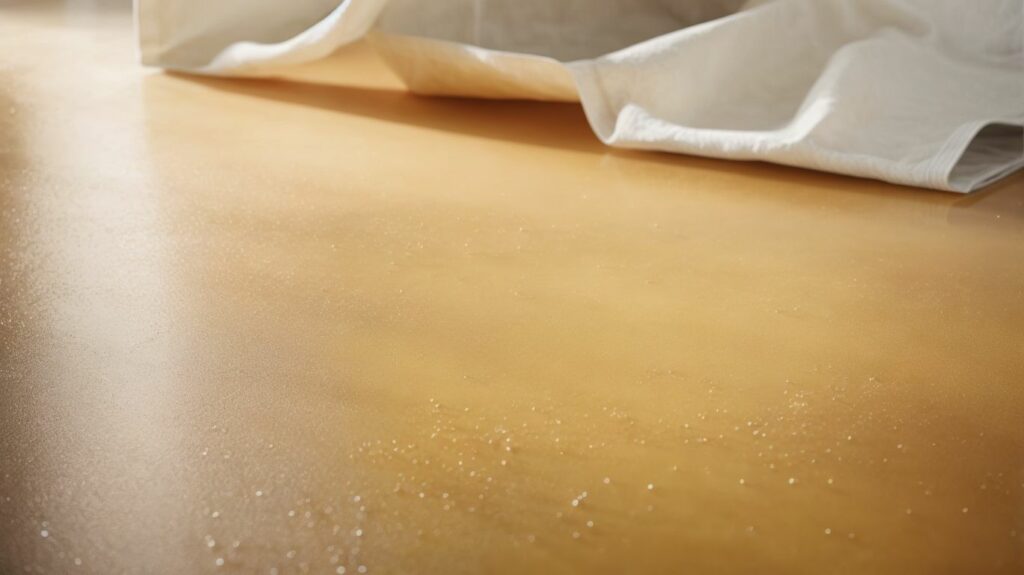

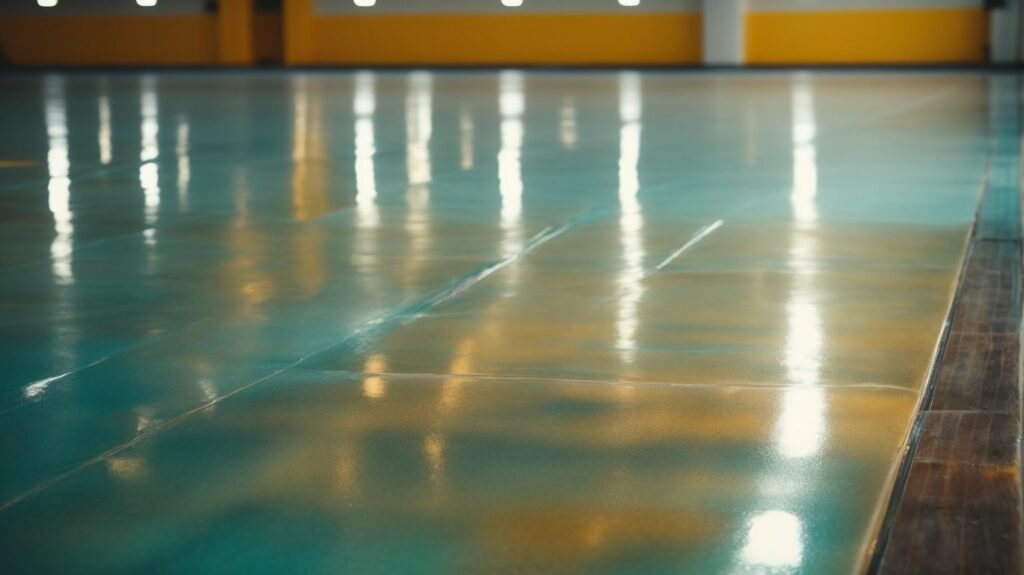

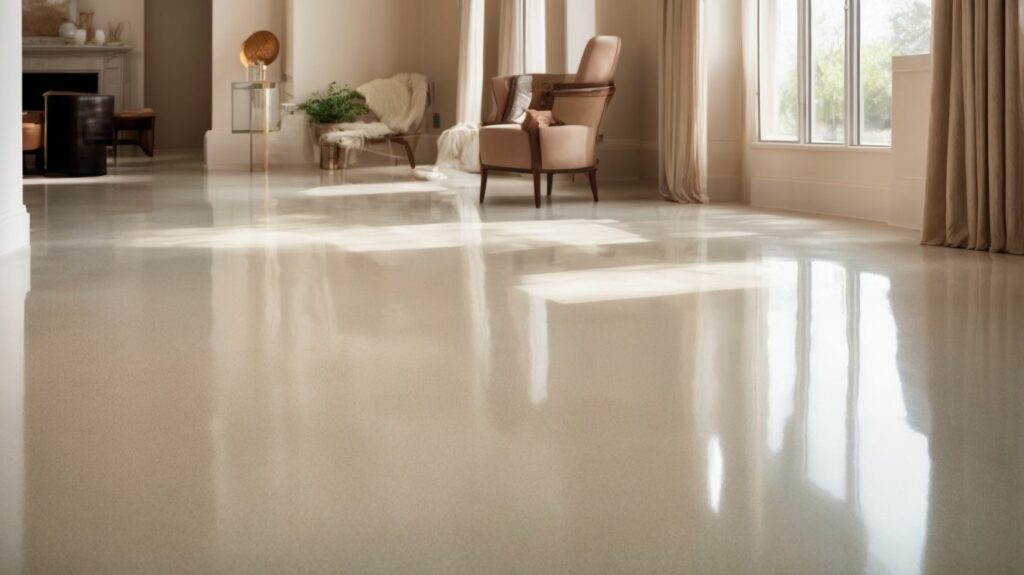
In the world of epoxy resin flooring, sustainable practices have gained significant importance. Epoxy resin flooring is a popular choice for its durability, versatility, and aesthetic appeal. However, the environmental impact of traditional epoxy resin flooring raises concerns regarding its sustainability. It is crucial to understand the need for sustainable practices in epoxy resin flooring and the efforts being made to mitigate its impact on the environment.
This article explores the concept of epoxy resin flooring, delves into the importance of sustainability in this industry, and examines the environmental impact of traditional epoxy resin flooring. It also highlights sustainable practices being adopted, such as the use of low VOC and green building certified epoxy resins, recycling and waste reduction measures, and energy efficiency initiatives. Furthermore, the benefits of sustainable epoxy resin flooring, including improved indoor air quality and reduced environmental impact, are discussed.
However, there are considerations and challenges to be aware of, such as the cost and affordability of sustainable options and the need to evaluate sustainability claims. Finally, the article looks towards the future, exploring what lies ahead for sustainable practices in epoxy resin flooring.
Epoxy resin flooring is a durable and versatile type of flooring commonly used in commercial and industrial settings. It is created by mixing epoxy resin with a hardener, resulting in a strong and chemical-resistant surface. Epoxy resin flooring is renowned for its high gloss finish and seamless appearance. It can withstand heavy traffic, impacts, and spills, making it ideal for areas requiring a durable and easy-to-clean surface. This flooring type is popular in warehouses, manufacturing facilities, hospitals, and laboratories. Epoxy resin flooring offers numerous benefits, including durability, chemical resistance, and customization options.
Sustainability is of utmost importance in the world of epoxy resin flooring to minimise the environmental impact associated with its production and use. By adopting sustainable practices, such as the use of low VOC and green building certified epoxy resins, recycling and waste reduction, and prioritising energy efficiency, the flooring industry can contribute to a greener future. Sustainable practices ensure improved indoor air quality, reduced environmental impact, and certification and compliance with sustainable standards. As the demand for eco-friendly materials increases, advancements in sustainable materials and technology will pave the way for a more sustainable epoxy resin flooring industry. Sustainability is vital to protect the planet and create a healthier environment for all.
Fun fact: Sustainable epoxy resin flooring can help reduce greenhouse gas emissions, contributing to the fight against climate change.
Traditional epoxy resin flooring can have a significant environmental impact. This section explores the environmental consequences of this widely used flooring option. From the chemical composition and VOC emissions to the generation and disposal of waste, we will uncover the facts that you need to know. Prepare to discover the not-so-eco-friendly aspects of traditional epoxy resin flooring and learn about its potential implications for the environment.
Chemical composition and VOC emissions are important factors to consider when discussing epoxy resin flooring. The table below provides a comparison of the chemical makeup and VOC emissions of different types of epoxy resins.
| Epoxy Resin Type | Chemical Composition | VOC Emissions |
|---|---|---|
| Traditional Epoxy Resin | Contains harmful chemicals such as volatile organic compounds (VOCs) and solvents. | High VOC emissions, contributing to air pollution and poor indoor air quality. |
| Low VOC Epoxy Resin | Formulated with fewer harmful chemicals and lower VOC content. | Reduced VOC emissions, promoting better indoor air quality and environmental sustainability. |
| Green Building Certified Epoxy Resin | Meets strict environmental standards, with minimal chemicals and VOCs. | Negligible VOC emissions, ensuring excellent air quality and environmental friendliness. |
By choosing epoxy resins with lower VOC emissions and sustainable certifications, one can minimize the negative impact on air quality and make a more environmentally conscious choice for epoxy resin flooring.
Waste generation and disposal are important considerations in the world of epoxy resin flooring. The environmental impact of traditional epoxy resin flooring can be significant due to its chemical composition and VOC emissions during installation and maintenance. Proper handling and disposal methods are required for waste generation and disposal. Sustainable practices aim to address these issues by promoting recycling and waste reduction. The use of low VOC and green building certified epoxy resins can also help minimize the environmental impact. By implementing these sustainable practices, the epoxy resin flooring industry can reduce waste generation and ensure responsible disposal.
When it comes to sustainable practices in epoxy resin flooring, there are many ways in which this industry is making a positive impact. The use of low VOC and green building certified epoxy resins, recycling and waste reduction, and energy efficiency all contribute to reducing the carbon footprint. This section will explore the different aspects of sustainability within epoxy resin flooring and how these practices are transforming the industry, benefiting both the environment and our communities.
Using low VOC and green building certified epoxy resins in flooring provides numerous benefits for both the environment and occupant health. Here are some reasons why:
1. Reduced emission of volatile organic compounds (VOCs), which contribute to indoor air pollution.
2. Enhanced indoor air quality, promoting a healthier and more comfortable living or working environment.
3. Compliance with green building standards and certifications, demonstrating a commitment to sustainability.
4. Utilisation of eco-friendly materials derived from renewable resources, minimising reliance on fossil fuels.
5. Contribution to reducing the carbon footprint and mitigating climate change.
By choosing low VOC and green building certified epoxy resins, you can ensure that your flooring choice aligns with sustainable practices and contributes to a healthier and greener future. Consider collaborating with suppliers and contractors who prioritise these environmentally friendly options to achieve the best results.
Recycling and waste reduction play a crucial role in promoting sustainability in epoxy resin flooring. The following practices can be adopted to minimize waste and encourage recycling:
Fun Fact: Recycling one ton of epoxy resin flooring materials can save up to 1.2 tons of carbon dioxide emissions, significantly reducing its environmental impact.
Reducing energy consumption and carbon footprint is essential in the world of epoxy resin flooring. Here are some ways to achieve energy efficiency and sustainability:
Pro-tip: Regularly maintaining and cleaning your epoxy resin flooring can help optimise energy efficiency and extend its lifespan.
Looking to explore the amazing advantages of sustainable epoxy resin flooring? In this section, we will discuss improved indoor air quality, reduced environmental impact, certification and compliance, and evaluating sustainability claims. Additionally, we will delve into the future of sustainable practices in the world of epoxy resin flooring. Prepare yourself to discover how this innovative flooring solution can have a positive impact on both your space and the environment.
Improved indoor air quality is one of the key benefits of sustainable epoxy resin flooring. Traditional epoxy resin flooring has the potential to release volatile organic compounds (VOCs) into the air, which can lead to poor indoor air quality and health problems. Sustainable epoxy resin flooring solutions prioritize the use of low VOC and green building certified resins, which helps to reduce the emission of harmful chemicals.
An example of how sustainable epoxy resin flooring improved indoor air quality can be seen in the case of a school in California. By replacing their old epoxy flooring with a low VOC and environmentally friendly option, the school witnessed a noticeable decrease in respiratory issues among students and staff.
Reducing the environmental impact is a crucial aspect of epoxy resin flooring. Implementing sustainable practices is necessary to minimise negative effects on the environment. These practices include using low VOC and green building certified epoxy resins, recycling and waste reduction measures, as well as focusing on energy efficiency and reducing the carbon footprint. By adopting these practices, epoxy resin flooring can contribute to improved indoor air quality, reduced waste generation, and a smaller environmental footprint. These sustainable practices also align with the changing demands and expectations of consumers for more environmentally friendly products. The future of epoxy resin flooring depends on advancements in sustainable materials and technology, collaboration among industry stakeholders, and adherence to industry standards.
Certification and compliance are vital aspects of sustainable epoxy resin flooring. They ensure that the flooring materials meet specific standards and regulations, promoting environmental responsibility and safety. Here is a table highlighting the significance of certification and compliance in epoxy resin flooring:
| Benefits | Importance |
| 1. Environmental sustainability | Promotes the use of eco-friendly materials and practices, reducing the impact on the environment. |
| 2. Safety and health | Certified flooring minimises the use of hazardous chemicals, ensuring a healthier indoor environment for occupants. |
| 3. Compliance with regulations | Meeting certification standards guarantees adherence to local, national, and international regulations governing sustainable building practices. |
| 4. Market acceptance | Certification enhances the marketability of epoxy resin flooring by demonstrating its compliance and commitment to sustainability. |
By prioritising certification and compliance, stakeholders in the epoxy resin flooring industry can contribute positively to the environment, human health, and industry standards.
Suggestions for stakeholders:
Evaluating sustainability claims is essential when selecting epoxy resin flooring. To assess the environmental impact of a product, consider the following factors:
| Chemical composition and VOC emissions | Waste generation and disposal | Energy efficiency and reduced carbon footprint | Certification and compliance |
|---|---|---|---|
| Look for low VOC and green building certified resins to minimise harmful emissions. | Choose products with recycling and waste reduction practices to minimise landfill waste. | Opt for materials that prioritise energy efficiency during production and use. | Verify if the product meets sustainability standards and certifications. |
Careful consideration and research are required to assess sustainability claims and ensure that you make an environmentally responsible choice.
The future of sustainable practices in epoxy resin flooring is looking promising. There have been advancements in materials and technology, as well as shifting consumer demands. The industry is adapting to meet these expectations and placing more emphasis on environmental responsibility. Collaboration between manufacturers, suppliers, and industry professionals is driving the development of sustainable materials and practices. There are also industry standards and certifications being established to ensure compliance and evaluate sustainability claims. However, cost and affordability remain a consideration and challenge when implementing these practices. To create a more sustainable future for epoxy resin flooring, it is crucial to continue pushing for innovation, education, and awareness within the industry.
The future of epoxy resin flooring is filled with exciting possibilities, driven by advancements in sustainable materials and technology, shifting consumer demands, and collaboration within the industry. This section explores the evolving landscape of epoxy resin flooring, from embracing eco-friendly options to meeting higher expectations. We will uncover the latest trends and innovations and delve into how the industry is paving the way for sustainable practices, ensuring a greener and more responsible future.
Advancements in sustainable materials and technology have resulted in significant improvements in epoxy resin flooring. This is evident in the development of eco-friendly epoxy resins that have a reduced environmental impact. These resins are made from renewable resources and have lower VOC emissions, which in turn leads to improved indoor air quality. New technologies have been introduced to make the production and installation processes more energy-efficient and reduce carbon footprint. With these advancements, epoxy resin flooring can now be considered a sustainable choice for various applications, offering durability, aesthetics, and environmental responsibility in one package.
| Innovations in Sustainable Materials and Technology for Epoxy Resin Flooring |
|---|
| 1. Eco-friendly epoxy resins made from renewable resources |
| 2. Reduced VOC emissions for improved indoor air quality |
| 3. Energy-efficient production and installation processes |
| 4. Technologies for waste reduction and recycling |
| 5. Integration of sustainable additives for enhanced performance |
Shifting consumer demands and expectations play a vital role in the world of epoxy resin flooring. Consumers are increasingly concerned about sustainability and environmental impact and seek products and materials that align with their values. They prioritise eco-friendly options that promote reduced VOC emissions, waste reduction, and energy efficiency. In response, manufacturers are developing sustainable materials and technologies to meet these demands. Collaboration and adherence to industry standards are also crucial factors. By staying attuned to shifting consumer demands and expectations, the epoxy resin flooring industry can continue to evolve and meet the needs of environmentally-conscious consumers.
Collaboration and industry standards play a crucial role in promoting sustainability in the world of epoxy resin flooring. Here are some key aspects to consider:
By working together and adhering to established standards, the epoxy resin flooring industry can cultivate a more sustainable and environmentally responsible future.
The development of sustainable practices in the epoxy resin flooring industry has been a collaborative effort among manufacturers, architects, and contractors. Through industry standards and shared knowledge, stakeholders have worked together to reduce environmental impact and promote transparency. This collaboration has led to innovative materials and technologies, ensuring that epoxy resin flooring meets strict sustainability criteria. As a result, the industry continues to evolve, striving for continuous improvement and a greener future.
Using sustainable epoxy resin flooring offers several advantages. Firstly, it helps reduce the carbon footprint and mitigate climate change as these floors are made from renewable resources. Additionally, they can be recycled at the end of their life cycle, contributing to a circular economy. These floors are also highly durable and resistant to wear and tear, making them suitable for high-traffic areas.
Eco-friendly epoxy floors, such as Everlast® Floors, contribute to a healthier workplace environment in multiple ways. They contain no harmful solvents, improving indoor air quality and preventing the release of chemicals into the environment. These floors are highly light reflective, creating a brighter working environment and boosting employee morale. The absence of harmful substances reduces the risk of respiratory problems and enhances overall employee well-being.
Choosing eco-friendly epoxy flooring demonstrates a commitment to sustainability and environmental responsibility. It enhances the brand image and reputation of a business, as consumers actively seek out environmentally conscious businesses. Additionally, eco-friendly flooring offers long-term cost savings as it is durable and requires less frequent replacement and maintenance.
Bio-based epoxy resin floors contribute to environmental conservation in several ways. They are made from renewable resources, reducing the consumption of natural resources. These floors can be recycled at the end of their life cycle, minimizing waste. By choosing bio-based epoxy resin floors, businesses help reduce their carbon footprint and support the principles of sustainability.
Epoxy floors offer various design benefits for commercial spaces. They have a glossy finish and are light reflective, enhancing the ambience and creating visually appealing interiors. The design flexibility of epoxy floors allows for zoning with different colors or patterns, which can differentiate specific areas within a store or other commercial facility. With a wide range of colors, finishes, and textures available, epoxy floors offer architects and designers the opportunity to create unique, engaging spaces.
Choosing sustainable epoxy resin flooring, such as bio-based or eco-friendly options, can have a positive impact on a business’s brand reputation. It demonstrates the company’s commitment to environmental responsibility and attracts environmentally conscious customers, investors, and partners. By opting for sustainable practices and materials, businesses position themselves as leaders in sustainability and differentiate themselves from competitors who may not prioritize eco-friendly practices.






























The Dos and Don’ts of Maintaining Your Epoxy Resin Flooring
Understanding Epoxy Resin Flooring
Epoxy resin flooring is a popular choice for industrial and commercial spaces due to its durability, versatility, and aesthetic appeal. It is a type of flooring that is created by mixing epoxy resin with a hardener, resulting in a strong and long-lasting surface. Epoxy resin flooring is known for its resistance to chemicals, stains, impacts, and heavy foot traffic, making it ideal for a range of applications.
The Dos of Maintaining Your Epoxy Resin Flooring
To ensure the longevity and appearance of your epoxy resin flooring, it is crucial to follow proper maintenance practices. Here are some dos to keep in mind:
Cleaning Dos: Regularly clean your epoxy resin flooring using a soft-bristle broom or a dust mop to remove dust and debris. damp mop the floor using a mild, pH-neutral cleaner to keep it free from stains and spills.
Regular Maintenance Dos: Conduct regular maintenance tasks, such as inspecting the flooring for any damages or wear and tear. Promptly address any issues to prevent them from worsening. Also, consider applying a fresh coat of epoxy resin finish every few years to maintain its protective layer.
Using Appropriate Cleaning Products and Techniques: Make sure to use cleaning products and techniques specifically designed for epoxy resin flooring. Harsh chemicals, abrasive cleaners, and scrubbing brushes can damage the surface. Stick to manufacturer-recommended products and gentle cleaning methods to preserve the integrity of the flooring.
The Don’ts of Maintaining Your Epoxy Resin Flooring
Avoiding certain practices is equally important in keeping your epoxy resin flooring in optimal condition. Here are some don’ts to remember:
Avoid Harsh Chemicals: Do not use harsh chemicals, such as bleach or ammonia-based cleaners, as they can corrode the epoxy resin coating. Stick to mild, non-abrasive cleaners that are safe for epoxy surfaces.
Avoid Scratching or Scuffing the Surface: Take caution to prevent scratching or scuffing the epoxy resin flooring. Avoid dragging heavy furniture or objects across the floor and use protective pads or furniture sliders to minimize the risk of damage.
Avoid Excessive Moisture: Epoxy resin flooring is generally water-resistant, but excessive moisture can lead to issues such as bubbling or peeling. Wipe up spills promptly and avoid leaving standing water on the floor for extended periods.
By following these dos and don’ts, you can maintain the beauty and functionality of your epoxy resin flooring. Taking proper care of your flooring will extend its lifespan and ensure that it continues to enhance your space for years to come.
Maintaining your epoxy resin flooring is crucial to keep it in good condition and extend its lifespan. To ensure proper maintenance, follow these guidelines:
Clean regularly with a soft bristle broom or a dust mop to remove dirt and debris.
Avoid using harsh cleaners or abrasive materials that may damage the epoxy surface.
Wipe up spills immediately to prevent staining or damage to the epoxy coating.
Avoid dragging heavy furniture or objects across the floor, as it can scratch or gouge the epoxy.
Place mats or rugs in high-traffic areas to protect the epoxy from excessive wear.
Avoid exposing the epoxy floor to extreme temperatures or direct sunlight, as it can cause fading or yellowing.
Follow the manufacturer’s guidelines for regular maintenance and reapplication of the topcoat if necessary.
By adhering to these guidelines, you can ensure that your epoxy resin flooring remains durable and visually appealing for many years to come.
Epoxy Resin Flooring and its Maintenance
Epoxy Resin Flooring is a durable and versatile option for both residential and commercial spaces. It consists of multiple layers of epoxy resin applied to a concrete surface, forming a strong and seamless finish that is resistant to chemicals, stains, and impact. This type of flooring provides a smooth and shiny surface that is easy to clean and maintain. It is commonly used in garages, warehouses, hospitals, and retail spaces due to its durability and aesthetic appeal. Epoxy Resin Flooring can be customised with different colours and finishes to match the design of any space, making it a popular choice for its longevity and low maintenance requirements.
Jane, a small business owner, installed Epoxy Resin Flooring in her boutique. She was impressed with its durability as it withstood heavy foot traffic and spilled liquids without any damage. It also enhanced the overall look of her store with its glossy finish. Jane found maintaining the Epoxy Resin Flooring to be effortless. Regular sweeping and occasional mopping were enough to keep it clean and shiny. She was pleased with her decision to choose Epoxy Resin Flooring as it provided both style and functionality to her boutique.
Epoxy resin flooring offers numerous benefits, making it an ideal choice for various applications. Here are some reasons to choose epoxy resin flooring:
Durability: Epoxy resin flooring is highly resistant to impact, chemicals, and abrasion, making it suitable for high traffic areas.
Longevity: With proper maintenance, epoxy resin flooring can last for many years, providing a cost-effective solution.
Easy to clean: Epoxy floors have a seamless and smooth surface, making them easy to clean and maintain.
Aesthetics: Epoxy resin flooring comes in a wide range of colours and finishes, allowing customisation to match any design aesthetic.
Safety: Epoxy floors are slip-resistant, creating a safer environment, especially in areas prone to spills or moisture.
These advantages make epoxy resin flooring a popular choice for commercial, industrial, and residential spaces.
Maintaining your epoxy resin flooring can be easy if you follow the correct guidelines. This section will discuss the necessary practices for keeping your flooring in the best condition. It will cover effective cleaning methods, regular maintenance tips, and the use of suitable cleaning products and techniques to maintain the beauty and longevity of your epoxy resin flooring. No more guessing, just a hassle-free maintenance routine!
When it comes to cleaning your epoxy resin flooring, it is important to follow these guidelines to ensure its longevity and maintain its appearance:
Following these cleaning guidelines will help keep your epoxy resin flooring in excellent condition for years to come.
Regular maintenance is essential to ensure the longevity and appearance of your epoxy resin flooring. Here are some important guidelines to keep in mind:
Pro-tip: Regular maintenance not only keeps your epoxy resin flooring looking its best but also helps to prolong its lifespan.
Using appropriate cleaning products and techniques is essential for maintaining the quality and integrity of your epoxy resin flooring. To ensure proper care, follow these steps:
By following these steps and using the appropriate cleaning products and techniques, you can maintain the cleanliness and longevity of your epoxy resin flooring.
When it comes to maintaining your epoxy resin flooring, there are certain things you should avoid. In this section, we will explore the mistakes to avoid when maintaining your epoxy resin flooring. We will discuss the importance of avoiding the use of harsh chemicals, being cautious about scratching or scuffing the surface, and the significance of keeping excessive moisture away. Let’s delve into these essential tips to ensure your flooring remains in excellent condition.
To maintain the longevity and appearance of your epoxy resin flooring, it is important to avoid using harsh chemicals that can damage the surface. Here are some steps to follow:
By avoiding harsh chemicals, you can maintain the integrity and beauty of your epoxy resin flooring for years to come.
Scratching or scuffing the surface of your epoxy resin flooring can compromise its appearance and durability. To prevent this, follow these guidelines:
A homeowner installed epoxy resin flooring in their garage. They diligently followed the maintenance tips and always used mats when parking their car. As a result, their flooring remained scratch-free and looked as good as new for years to come.
Excessive moisture can be harmful to epoxy resin flooring, causing damage and reducing its lifespan. To protect your flooring, it is important to follow these guidelines:
By avoiding excessive moisture and taking proactive measures, you can maintain the integrity and durability of your epoxy resin flooring.
To ensure the longevity of your epoxy resin flooring and maintain its appearance, it is important to follow these tips:
By following these tips, you can extend the lifespan of your epoxy resin flooring and keep it looking its best for many years to come.
When it comes to maintaining your epoxy resin flooring, it is important to avoid these common mistakes. From ignoring the manufacturer’s guidelines to using incorrect maintenance techniques and neglecting regular cleaning and maintenance, each sub-section reveals a specific pitfall that can affect the durability and appearance of your epoxy resin floor. Let’s now explore the dos and don’ts to ensure your flooring remains in excellent condition for many years.
When maintaining your epoxy resin flooring, it is essential to adhere to the manufacturer’s guidelines. Failing to do so can result in various issues and decrease the lifespan of your flooring. Some common mistakes to avoid include using improper maintenance techniques and neglecting regular cleaning and maintenance. By disregarding the manufacturer’s guidelines, you run the risk of using cleaning products or techniques that may harm the flooring, leading to expensive repairs or replacement. It is crucial to carefully read and comprehend the guidelines provided by the manufacturer to ensure the proper care and maintenance of your epoxy resin flooring.
Using improper maintenance techniques can have detrimental effects on your epoxy resin flooring. To ensure the longevity and durability of your flooring, it is important to follow proper maintenance practices. Here are some steps to avoid using improper techniques:
These proper maintenance techniques will help preserve the appearance and integrity of your epoxy resin flooring.
True story: John, a homeowner, made the mistake of using a highly abrasive cleaning tool on his epoxy resin flooring. As a result, he ended up scratching the surface and damaging the finish. He learned the hard way that using improper maintenance techniques can have costly consequences.
Neglecting regular cleaning and maintenance of epoxy resin flooring can lead to a decrease in its lifespan and durability. To ensure the longevity of your flooring, here are some important tips to keep in mind:
By following these guidelines, you can prevent unnecessary wear and tear and maintain the beauty and functionality of your epoxy resin flooring for years to come.
DO keep the surface free of dirt and grit by regularly vacuuming with a soft brush attachment.
DO use warm water and a mop or deck-scrubbing brush for regular cleaning.
DO clean up spills, oil, car chemicals, and other chemicals immediately with shop towels.
DO lightly scrub stains like rust with warm water and a kitchen scrubbing sponge or soft deck brush.
DON’T use soap-based cleaners as they leave a haze on the epoxy flooring.
DON’T use harsh chemicals, steel wool, or abrasive liquids on the surface.
DON’T let car spills sit on the floor surface for too long to prevent potential hazards and damage.
DON’T use surface waxes or sealants as they can make the floor slippery.
DON’T use cleaners containing water-soluble, inorganic or crystallizing salts, damaging alkali or acids as they can be hazardous to the epoxy flooring.
Reference: https://plidek.com/maintenance-guide-epoxy-floors/
DO keep the surfaces free of dirt and grit, especially when moving heavy machinery or vehicles.
DO regularly vacuum using a shop vacuum with a soft brush attachment.
DO clean outdoor epoxy floors with warm/hot water and a clear ammonia/water mix for heavy soiling.
DO spot clean by vacuuming or sweeping the area and mopping with warm water.
DON’T use soap-based cleaners as they can leave a haze on the epoxy flooring.
DON’T use harsh chemicals and steel wool on the surface.
DON’T allow car spills or paint to sit on the floor surface for too long to prevent potential hazards and damage.
Reference: https://plidek.com/maintenance-guide-epoxy-floors/
DO test all cleaning items in a small area before cleaning the entire floor.
DO daily dust mop high traffic areas to remove dust and grit that can dull the surface.
DO scrub the floor at least once a week for the first 2-3 months for newly installed epoxy flooring.
DO wash the floor thoroughly to avoid slippery residue after scrubbing.
DON’T let the cleaner dry on the surface, allow it to work and loosen any foreign matter.
DON’T use surface waxes or sealants as they can make the floor slippery.
DON’T use cleaners containing water-soluble, inorganic or crystallizing salts, damaging alkali or acids as they can be hazardous to the epoxy flooring.
DON’T mix cleaners and follow the manufacturer’s instructions.
Reference: https://amazinggaragefloors.net/dos-and-donts-for-cleaning-epoxy-floors/
DO test all cleaning items in a small area before cleaning the entire floor.
DO daily dust mop high traffic areas to remove dust and grit that can dull the surface.
DO scrub the floor at least once a week for the first 2-3 months for newly installed epoxy flooring.
DO wash the floor thoroughly to avoid slippery residue after scrubbing.
DON’T let the cleaner dry on the surface, allow it to work and loosen any foreign matter.
DON’T use surface waxes or sealants as they can make the floor slippery.
DON’T use cleaners containing water-soluble, inorganic or crystallizing salts, damaging alkali or acids as they can be hazardous to the epoxy flooring.
DON’T mix cleaners and follow the manufacturer’s instructions.
Reference: https://amazinggaragefloors.net/dos-and-donts-for-cleaning-epoxy-floors/
DO test all cleaning items in a small area before cleaning the entire floor.
DO daily dust mop high traffic areas to remove dust and grit that can dull the surface.
DO scrub the floor at least once a week for the first 2-3 months for newly installed epoxy flooring.
DO wash the floor thoroughly to avoid slippery residue after scrubbing.
DON’T let the cleaner dry on the surface, allow it to work and loosen any foreign matter.
DON’T use surface waxes or sealants as they can make the floor slippery.
DON’T use cleaners containing water-soluble, inorganic or crystallizing salts, damaging alkali or acids as they can be hazardous to the epoxy flooring.
DON’T mix cleaners and follow the manufacturer’s instructions.
Reference: https://amazinggaragefloors.net/dos-and-donts-for-cleaning-epoxy-floors/
DO test all cleaning items in a small area before cleaning the entire floor.
DO daily dust mop high traffic areas to remove dust and grit that can dull the surface.
DO scrub the floor at least once a week for the first 2-3 months for newly installed epoxy flooring.
DO wash the floor thoroughly to avoid slippery residue after scrubbing.
DON’T let the cleaner dry on the surface, allow it to work and loosen any foreign matter.
DON’T use surface waxes or sealants as they can make the floor slippery.
DON’T use cleaners containing water-soluble, inorganic or crystallizing salts, damaging alkali or acids as they can be hazardous to the epoxy flooring.
DON’T mix cleaners and follow the manufacturer’s instructions.
Reference: https://amazinggaragefloors.net/dos-and-donts-for-cleaning-epoxy-floors/






























Epoxy resin flooring, a popular choice for residential and commercial spaces, offers a range of benefits that set it apart from other flooring options. Epoxy resin flooring is a type of floor coating that is created by mixing epoxy resin with a hardener, resulting in a durable and high-performance surface. It is known for its versatility, strength, and longevity.
Benefits of epoxy resin flooring include its exceptional durability, resistance to chemicals, stains, and wear, easy maintenance, and hygienic properties. It is also highly customizable in terms of appearance and design options, allowing for endless possibilities to match any aesthetic preference. Epoxy resin flooring offers a seamless and smooth surface, making it a safe and practical choice.
However, epoxy resin flooring does have some drawbacks, including its initial installation cost and the need for professional installation due to its complex application process. It can also be susceptible to heat and UV damage, requiring proper maintenance and care.
To determine the best flooring option, it is essential to compare epoxy resin flooring with other popular choices such as hardwood, laminate, tile, carpet, and vinyl flooring. Consider factors such as durability, maintenance, cost, appearance, and safety when making a decision.
By examining and evaluating these key factors, you can make an informed choice that suits your specific needs and preferences. Whether you prioritize longevity, ease of maintenance, or aesthetic appeal, understanding the pros and cons of epoxy resin flooring in comparison to other flooring options is crucial in choosing the best flooring solution.
Epoxy Resin Flooring: An Overview
Epoxy resin flooring is a versatile and durable option for both residential and commercial spaces. It offers high durability, making it highly resistant to chemicals, stains, and impact, which is ideal for high-traffic areas. Additionally, the seamless and non-porous surface of epoxy resin flooring makes it easy to clean and maintain. This type of flooring also provides customizable options with a variety of colours, patterns, and finishes, allowing for endless design possibilities. In terms of cost-effectiveness, epoxy resin flooring offers a long lifespan and minimal maintenance requirements, making it a wise investment in the long run.
Furthermore, epoxy resin flooring can withstand heavy vehicular traffic, making it a popular choice for parking garages and industrial spaces.
Epoxy resin flooring is a durable and versatile flooring option that is created by mixing epoxy resin with a hardener. It produces a seamless, glossy surface that is resistant to chemicals, stains, and wear. This flooring option is commonly used in commercial, industrial, and residential settings due to its durability and aesthetic appeal. It is easy to clean and maintain, making it a popular choice for high traffic areas. Epoxy resin flooring can be customised with different colours, patterns, and textures to suit any design aesthetic. It offers a long-lasting and attractive solution for various flooring needs.
Pro-tip: It is advisable to consult with a professional flooring contractor to ensure that epoxy resin flooring is the best option for your specific needs and requirements.
Epoxy resin flooring provides numerous benefits, making it a popular choice for both residential and commercial spaces. The advantages include its durability, chemical and stain resistance, versatility, seamless and hygienic nature, and longevity. Epoxy resin flooring can withstand heavy foot traffic, making it ideal for high-traffic areas like warehouses and garages. It is also resistant to chemicals, oils, and stains, making it easy to clean and maintain. Additionally, it can be customized with a variety of colours, patterns, and finishes, allowing you to create a unique look for your space. The seamless surface of epoxy resin flooring eliminates cracks and crevices where dirt and bacteria can accumulate. With proper installation and maintenance, epoxy resin flooring can last for many years, providing long-term cost savings. Choosing epoxy resin flooring can enhance the aesthetics and functionality of any space, providing a durable, low-maintenance, and visually appealing flooring solution.
One example of the drawbacks of epoxy resin flooring is a homeowner who installed it in their garage, only to realise that the limited design options did not match the aesthetic of their home. Consequently, they had to invest more time and money to remove and replace the flooring with a more suitable option.
Epoxy resin flooring stands out as a superior choice when compared to other flooring options such as hardwood, laminate, tile, carpet, and vinyl flooring. In this section, we will compare the pros and cons, durability, maintenance, and overall performance of epoxy resin flooring against these contenders. This comparison will help you make an informed decision, ensuring that your floors look flawless and remain strong.
Translated text:
Epoxy resin flooring stands out as a superior choice when compared to other flooring options such as hardwood, laminate, tile, carpet, and vinyl flooring. In this section, we will compare the pros and cons, durability, maintenance, and overall performance of epoxy resin flooring against these contenders. This comparison will help you make an informed decision, ensuring that your floors look flawless and remain strong.
Epoxy resin flooring is a popular choice for commercial and industrial spaces, but how does it compare to hardwood flooring? Here are some factors to consider when deciding between the two options:
Consider these factors when choosing between epoxy resin flooring and hardwood flooring to make an informed decision based on your specific needs and preferences.
Epoxy resin flooring and laminate flooring are two popular options for residential and commercial spaces. Here is a comparison of both types:
| Epoxy Resin Flooring | Laminate Flooring |
| Durable and Long-lasting | Less durable and prone to scratches |
| Low Maintenance | Requires regular cleaning and maintenance |
| Higher Cost | More affordable |
| Versatile in Design and Appearance | Limited design options |
| Resistant to Chemicals and Stains | Less resistant to stains and chemicals |
When choosing between epoxy resin flooring and laminate flooring, consider factors such as durability, maintenance, cost, design options, and resistance to chemicals. Epoxy resin flooring offers greater durability and low maintenance, but comes at a higher cost. Laminate flooring is more affordable but requires regular cleaning and maintenance. Ultimately, the choice depends on individual preferences and the specific needs of the space.
When comparing epoxy resin flooring to tile flooring, it is important to consider various factors to determine the best option for your needs.
When making a decision, consider your specific requirements and consult with flooring professionals to determine which option is best suited for your space.
Epoxy resin flooring and carpet flooring are two popular options, each with their unique benefits and drawbacks.
| Aspect | Epoxy Resin Flooring | Vinyl Flooring |
| Durability | Extremely durable, resistant to heavy traffic, impact, and chemicals. | Durable, but more susceptible to scratches and wear in high traffic areas. |
| Maintenance | Requires minimal maintenance, easy to clean and maintain. | Low maintenance, regular sweeping and occasional mopping required. |
| Cost | Higher initial cost, but provides long-term cost savings due to durability. | Lower initial cost, but may need more frequent replacement. |
| Appearance | Can create a seamless, glossy finish with a range of colours and designs. | Offers a variety of designs and styles, including realistic wood and tile looks. |
| Safety | Slip-resistant when textured, resistant to bacteria and mould growth. | Can be slippery when wet, may not be as resistant to bacteria and mould. |
Fact: According to a study, epoxy resin flooring has been found to have a longer lifespan compared to vinyl flooring, making it a popular choice for commercial and industrial applications.
When choosing the ideal flooring, it is important to consider several factors. In this section, we will explore the factors that distinguish a flooring option in terms of durability, maintenance, cost, appearance, and safety. Whether you are comparing epoxy resin flooring to other options or exploring alternative choices, understanding these key factors will enable you to make an informed decision that suits your requirements and enhances your space. Let’s delve into the details and find your perfect flooring match!
Durability and longevity are important factors to consider when choosing the best flooring option. Epoxy resin flooring provides exceptional durability and can withstand heavy foot traffic, impacts, and chemical spills. Its seamless and non-porous surface prevents moisture damage, making it highly resistant to stains and bacterial growth. With proper maintenance, epoxy resin flooring can last for decades without the need for replacement. In comparison, hardwood flooring may require refinishing or replacement due to wear and tear over time. Laminate and vinyl flooring, although affordable, have a shorter lifespan and may need to be replaced more frequently. Carpet and tile flooring can also wear down and show signs of aging over time.
Maintaining and cleaning epoxy resin flooring is crucial to ensure its longevity and appearance. To achieve this, follow these steps:
Cost is an important factor to consider when choosing the best flooring option for your space. Here are some points to consider:
Consider your budget and long-term costs when making a decision on the best flooring option for your needs.
When considering epoxy resin flooring, the appearance and design options are key factors to take into account. Here are some factors to consider:
Fact: Epoxy resin flooring is not only aesthetically pleasing but also offers durability and easy maintenance, making it a popular choice for both residential and commercial spaces.
Choosing the best flooring for your space involves considering safety and health factors. Here are some factors to keep in mind:
By considering these safety and health factors, you can choose a flooring option that meets your needs and promotes a safe and healthy environment.
Yes, epoxy resin flooring is known for its durability and can withstand heavy duty wear and tear better than traditional options like vinyl or carpet.
Epoxy flooring is typically recommended to be installed by professionals as it requires specialized knowledge and equipment for proper application.
Epoxy resin flooring can be used in both indoor and outdoor areas, as it is resistant to chemicals, stains, moisture, and UV rays. However, it may require additional UV protection for prolonged exposure to direct sunlight.
Epoxy flooring is easy to clean and maintain, making it a practical choice for high-traffic areas. It is non-porous, which means it is resistant to staining and can be easily wiped clean.
Yes, epoxy flooring can be installed over an existing floor surface, provided that the subfloor is in good condition and properly prepared. However, it is recommended to consult with a professional to ensure proper installation.
While epoxy flooring offers many benefits, it does have limitations. Over time, it may fade or develop a subtle yellowish tinge when exposed to direct sunlight. It can also scuff and scratch if not properly maintained. However, these issues can be minimized by using darker or yellow-based colors, applying topcoats for UV protection, and using clear polyurethane topcoats with greater scuff and scratch resistance.






























Epoxy resin flooring is a durable and versatile flooring material that is widely used in commercial and industrial settings. It is a type of flooring that is created by combining epoxy resin, a hardening agent, and other additives to create a strong and seamless surface. Epoxy resin flooring offers numerous benefits, including resistance to chemicals, ease of maintenance, and long lifespan.
Extending the life of epoxy resin flooring is important to ensure its longevity and maintain its aesthetic appeal. Proper maintenance and care can help minimise wear and tear, prevent damage, and prolong the lifespan of the flooring. By following best practices, you can maximise the durability and performance of your epoxy resin flooring.
Before installation, proper preparation is crucial to ensure the longevity of the epoxy resin flooring. This includes thorough surface preparation by removing any dirt, oil, or debris, conducting moisture testing to identify any potential issues, repairing cracks and joints, and ensuring the surface is properly cleaned and dry.
Once the epoxy resin flooring is installed, it is essential to follow the best practices for maintenance. This includes regular cleaning using non-abrasive and non-acidic cleaning agents, avoiding the use of harsh chemicals that can damage the flooring, preventing scratches and dents by using furniture pads and avoiding dragging heavy objects, and conducting regular inspections to identify any signs of damage or wear.
Appropriate usage is also crucial in extending the life of epoxy resin flooring. This involves resisting heavy impact by using proper equipment and tools, avoiding prolonged exposure to heat that can cause discolouration or damage, and preventing chemical spills that can corrode the flooring.
In case of any common issues with the epoxy resin flooring such as discoloration, peeling, or the formation of bubbles, troubleshooting steps can be taken to address the problems and prevent further damage.
For professional maintenance and restoration of the epoxy resin flooring, it is recommended to consult with experts in the field who can provide the necessary care and support to ensure the longevity and performance of the flooring.
By following these best practices and taking appropriate measures, you can extend the life of your epoxy resin flooring and enjoy its benefits for years to come.
Epoxy Resin Flooring is a type of flooring that is widely used in commercial and industrial spaces. It is popular due to its durability and aesthetic appeal. The flooring is made of epoxy resin, a chemical compound that creates a strong and protective surface when it cures. It is highly resistant to chemical spills, abrasions, and heavy traffic. With a wide range of colours and finishes available, it can be customised to suit various design preferences. Epoxy resin flooring finds its application in warehouses, hospitals, garages, and manufacturing facilities, where durability is of utmost importance.
Extending the life of epoxy resin flooring is important due to various reasons. Firstly, it helps protect your investment since replacing flooring can be expensive. Additionally, it ensures a safe and clean environment by preventing cracks and deterioration that could potentially lead to accidents. Moreover, maintaining the longevity of epoxy resin flooring reduces the need for frequent repairs and replacements, thus saving valuable time and resources. To significantly extend the lifespan of the flooring, regular maintenance such as cleaning and resealing is essential. It is crucial to remember that prevention is key in avoiding damage and preserving the integrity of epoxy resin floors. As a pro-tip, using floor mats in high-traffic areas can help minimize wear and tear.
Proper preparation is essential before installing epoxy resin flooring. This includes surface preparation, moisture testing, repairing cracks and joints, and ensuring thorough cleaning. By following these best practices diligently, you can significantly extend the lifespan of your epoxy resin flooring. Let’s now explore each sub-section and discuss the crucial steps to ensure a successful installation and long-lasting results.
Before installing epoxy resin flooring, it is important to properly prepare the surface. This step is crucial in order to achieve a long-lasting and durable finish. Here are the key steps to follow:
It is important to remember that proper surface preparation is essential for enhancing the performance and lifespan of epoxy resin flooring. By following these steps, you can ensure a strong bond and a beautiful finish that will last for years to come.
Moisture testing is an essential step in the preparation before installing epoxy resin flooring. It is necessary to identify any underlying moisture issues that may affect the durability and performance of the flooring. Here are the steps for moisture testing:
By conducting moisture testing, you can ensure a solid foundation for your epoxy resin flooring, avoiding future issues caused by moisture-related problems.
To effectively repair cracks and joints in epoxy resin flooring, follow these steps:
Remember to seek professional assistance for larger or more severe crack and joint repairs. Regular maintenance and prompt repairs will help extend the lifespan of your epoxy resin flooring, keeping it looking good for years to come.
Proper cleaning is crucial for maintaining the longevity and appearance of epoxy resin flooring. To ensure effective cleaning, follow these steps:
Brian, a proud owner of an epoxy resin garage floor, followed these cleaning steps diligently. His floor remained in top condition for years, impressing every visitor. With proper maintenance, Brian’s floor withstood heavy traffic and looked as good as new. His investment of time and effort in regular cleaning paid off, saving him from costly repairs and replacements.
Best Practices for Maintaining Epoxy Resin Flooring
Maintaining your epoxy resin flooring doesn’t have to be a never-ending chore. This section explores the best practices that will help you extend the life of your flooring. We will discuss simple cleaning techniques, avoiding harsh chemicals, preventing scratches and dents, utilizing floor mats and protectors, and conducting regular inspections. By following these practices, you can say goodbye to costly repairs and enjoy a pristine and long-lasting epoxy resin floor.
Regular cleaning is crucial for maintaining the longevity of epoxy resin flooring. Here are some best practices to follow for regular cleaning:
By following these regular cleaning practices, you can keep your epoxy resin flooring looking attractive and in top condition for years to come.
Avoiding harsh chemicals is crucial for the proper maintenance and preservation of epoxy resin flooring. Harsh chemicals can damage the protective coating and diminish the lifespan of the flooring. Here are some tips for avoiding harsh chemicals:
True story: A company in Boston had a beautiful epoxy resin floor in their garage. They always followed proper maintenance techniques and avoided harsh chemicals. As a result, their floor remained in top condition for many years, impressing everyone who visited their garage. Their careful attention to avoiding harsh chemicals saved them from costly repairs or replacements.
To prevent scratches and dents on your epoxy resin flooring, follow these steps:
By implementing these preventive measures, you can maintain the appearance of your epoxy resin flooring and extend its lifespan. Remember to always follow the manufacturer’s instructions and consult professionals for any specific maintenance or repair needs.
Using floor mats and protectors is crucial for prolonging the life of your epoxy resin flooring. Here are some reasons why:
By using floor mats and protectors, you can preserve the beauty and integrity of your epoxy resin flooring for a longer time, saving you money on repairs or replacements.
Regular inspections are essential for maintaining the longevity and performance of epoxy resin flooring. Follow these steps to ensure its top condition:
By conducting regular inspections, you can identify any minor issues early on and address them promptly, prolonging the lifespan of your epoxy resin flooring.
To ensure the longevity and durability of your epoxy resin flooring, it is important to follow certain practices. In this section, we will discuss the significance of appropriate usage and ways to avoid potential damages. We will provide essential tips and tricks to maintain the integrity of your epoxy resin flooring, including resisting heavy impacts and preventing chemical spills. Let’s explore these practices to extend the lifespan of your epoxy resin flooring.
Resisting heavy impact is essential for maintaining the integrity and longevity of epoxy resin flooring. Here are some best practices:
Avoiding prolonged exposure to heat is essential for maintaining the longevity and quality of epoxy resin flooring. Here are some steps to follow:
Here’s a true story: A business owner neglected to protect their epoxy resin flooring from heat and placed a hot grill directly on the floor. The excessive heat caused the epoxy to warp and crack, resulting in costly repairs.
Preventing chemical spills is essential for maintaining the integrity and longevity of epoxy resin flooring. Here are some steps to follow:
Implement proper storage and handling procedures for chemicals to reduce the risk of spills.
Label and segregate chemicals correctly to avoid confusion and accidental spills.
Train employees on safe handling practices to minimize the likelihood of spills.
Use secondary containment measures such as drip trays or spill pallets to capture any potential spills.
Regularly inspect storage areas and equipment for leaks or damage that could lead to spills.
Have spill response kits readily available to quickly address any spills that do occur.
Clean spills immediately using appropriate absorbents and follow proper disposal procedures.
Evaluate the effectiveness of spill prevention measures regularly and make necessary adjustments.
By implementing these preventative measures, you can minimise the risk of chemical spills and protect your epoxy resin flooring from potential damage.
If you are experiencing unexpected issues with your epoxy resin flooring, do not worry! This section will discuss troubleshooting common problems that may occur. These issues include discoloration, peeling, and the formation of bubbles. Prepare your toolkit and be ready to face these challenges. With our guidance, you will be able to say goodbye to any flooring concerns and welcome a vibrant, long-lasting epoxy resin floor that will impress everyone.
The discolouration of epoxy resin flooring is a common issue that can occur due to various factors, such as exposure to UV rays, chemical spills, or improper cleaning.
| Causes of Discolouration | Solutions |
| Exposure to UV rays | Apply a UV-resistant topcoat or use curtains or blinds to block sunlight. |
| Chemical spills | Wipe up spills immediately and avoid using harsh chemicals. |
| Improper cleaning | Use mild detergents or dishwashing liquid and avoid abrasive particles. |
To prevent discolouration, it’s important to take proper care of your epoxy resin flooring. Regular cleaning, using safe cleaning products, and addressing stains promptly can help maintain its appearance. Protecting the floor from direct sunlight and avoiding harsh chemicals can help minimise discolouration.
When it comes to epoxy resin flooring, the formation of bubbles can be a common issue. These bubbles can have a negative impact on the appearance and performance of the flooring. To prevent this problem, it is important to follow proper installation techniques. It is essential to ensure that the surface is properly prepared and free of any moisture. Using a roller with a spike or paddle attachment can help to release any trapped air during the application process. Regular inspections and maintenance routines should be implemented to identify and address any bubbles that may form over time. By taking these precautions, the formation of bubbles can be minimized, preserving the integrity and longevity of the epoxy resin flooring.
By following these steps, you can ensure that your epoxy resin flooring remains in excellent condition for years to come. Hiring a professional for maintenance and restoration will help keep your flooring looking its best and extend its overall lifespan.
Regular maintenance and proper care are essential for extending the lifespan of your epoxy floor. Sweep the floor daily with a soft-bristle brush to prevent dust and abrasive particle build-up. Wash the floor once a week with a mild detergent solution. Treat spills immediately to avoid damage to the surface.
Do use a soft brush and mild detergents for cleaning. Don’t use abrasive cleaning tools or harsh chemical cleaners that can damage the epoxy. Avoid excessive water that can weaken adhesive bonds. Promptly clean oil, grease, and chemical spills to prevent damage.
To enhance the performance and attractiveness of your epoxy floor, consider the following tips: regularly sweep with a dust mop or soft-bristle broom, use pH-neutral cleaners specifically formulated for epoxy flooring, promptly treat food stains and use specialized cleaning agents for paint and ink stains. Periodically reseal or recoat the floor to restore its luster.
In a garage, it is important to invest time and effort in effective maintenance routines. Regularly clean the floor with a soft-bristle broom and mild detergent solution. Use walk-off mats to minimize dirt and debris. Consider overhead storage solutions and wall organizers to keep the garage clean and safe.
To minimize repairs and expensive replacements, follow these tips: promptly clean spills to prevent damage, avoid dragging heavy objects with sharp edges that can scratch the floor, use walk-off mats to reduce wear, and consult a professional to determine if resealing or recoating is necessary.
If your epoxy floor is severely damaged, it may require professional assistance. However, you can try troubleshooting tips such as using absorbent materials to neutralize chemical spills, using mild detergent or dishwashing liquid for cleaning, and using rubber mats in areas with heavy machinery or traffic to reduce further damage.






























Safety is of utmost importance in industrial settings, and one crucial aspect that contributes to a safe working environment is the use of epoxy resin flooring. Epoxy resin flooring is a popular choice in industrial settings due to its durability, chemical resistance, and ease of maintenance.
Epoxy resin refers to a type of thermosetting polymer that is created through the reaction of a resin and a hardener. It is known for its excellent strength, adhesive properties, and resistance to chemicals, making it suitable for various industrial applications.
When applied as flooring, epoxy resin creates a strong and seamless surface that can withstand heavy foot traffic, machinery, and exposure to harsh substances. This type of flooring offers enhanced safety and slip resistance, reducing the risk of accidents and injuries in industrial environments.
Safety is crucial in industrial settings due to the potential hazards present. These can include slips and falls, chemical spills, fire hazards, and electrical risks. Having proper safety measures in place helps protect workers and minimizes the chances of accidents, injuries, and costly downtime.
In addition to ensuring safety, epoxy resin flooring offers several benefits in industrial settings. Its chemical resistance makes it ideal for environments where hazardous substances are present. The flooring’s durability and impact resistance allow it to withstand the demands of heavy machinery and equipment. Easy maintenance and hygiene are also key advantages, as the smooth and non-porous surface of epoxy resin flooring can be easily cleaned to maintain a clean and safe working environment.
To ensure safety with epoxy resin flooring, proper installation and regular maintenance are essential. Choosing the right epoxy resin flooring system that suits the specific needs of the industry is also crucial. Implementing safety measures and providing training to employees on how to work safely in industrial settings are important aspects of maintaining a safe workplace.
By understanding the importance of safety and utilizing epoxy resin flooring, industrial settings can create a secure and reliable environment where workers can perform their duties without unnecessary risks.
Ensuring safety in industrial settings with epoxy resin flooring is crucial for the well-being of workers and the success of the business. Here are some key points to consider:
1. Slip resistance: Epoxy resin flooring can be designed to provide excellent slip resistance, reducing the risk of accidents caused by slips and falls.
2. Chemical resistance: Epoxy resin flooring is highly resistant to chemicals, protecting workers from hazardous spills and leaks.
3. Durability: Epoxy resin flooring is durable and long-lasting, minimizing the need for frequent repairs or replacements that could pose safety risks.
4. Hygiene: Epoxy resin flooring is easy to clean and maintain, promoting a clean and hygienic work environment.
In a manufacturing facility, the implementation of epoxy resin flooring resulted in a significant reduction in workplace accidents and injuries. The slip-resistant surface provided greater stability for workers, leading to improved safety standards and increased productivity.
Epoxy resin flooring is a popular choice for industrial settings because of its durability, resistance to chemicals, and ease of maintenance. It is a type of flooring that is made by combining resin and hardener to create a strong and seamless surface. To understand epoxy resin flooring, it is necessary to understand its application process, which includes surface preparation, mixing, and curing. Additionally, it is important to be aware of the benefits it offers, such as improved safety features, customization options, and a long lifespan. Epoxy resin flooring is a versatile and efficient solution that provides a safe and durable surface for industrial environments.
Epoxy resin is a versatile polymer made from a combination of epoxy monomers and a curing agent. This unique property makes it ideal for various industrial applications, including flooring. Epoxy resin flooring is a type of flooring system that is created by applying multiple layers of epoxy resin to a prepared surface. This results in a strong, durable, and chemical-resistant flooring surface that is ideal for industrial settings. Epoxy resin flooring offers numerous benefits, including enhanced safety and slip resistance, chemical resistance for hazardous environments, durability, and easy maintenance. It is important to ensure proper installation and maintenance of epoxy resin flooring to maximize its safety benefits in industrial settings.
Epoxy resin flooring is a type of flooring that is made from a combination of epoxy resin and hardeners. It is known for its durability, chemical resistance, and easy maintenance. Epoxy resin flooring is commonly used in industrial settings due to its ability to withstand heavy machinery, chemicals, and high foot traffic. It provides a smooth and seamless surface that is easy to clean and maintain. Epoxy resin flooring can be customised with different colours and designs to suit the aesthetics of the space. Epoxy resin flooring is a practical and versatile option for industrial environments.
For those considering epoxy resin flooring, it is important to understand the specifics of the installation and maintenance process. Hiring a professional installer is crucial to ensure proper installation, which will maximise the flooring’s durability and safety features. Selecting the right epoxy resin flooring system for the specific industrial setting is essential. Different systems offer varying levels of chemical resistance, slip resistance, and impact resistance, so it is important to choose the one that best suits the needs of the facility. Implementing safety measures and providing training to employees on how to properly maintain and clean the epoxy resin flooring is vital to ensure a safe working environment.
With its numerous benefits and importance in industrial settings, epoxy resin flooring is a reliable and practical choice for businesses. It offers enhanced safety and slip resistance, chemical resistance for hazardous environments, durability, and easy maintenance. By taking the necessary precautions and following proper installation and maintenance procedures, businesses can ensure the longevity and safety of their epoxy resin flooring. Ultimately, investing in epoxy resin flooring is an investment in the safety and productivity of the industrial setting.
In industrial settings, it is crucial to prioritize safety to protect workers and prevent accidents. Employers should give top priority to safety measures, including providing comprehensive training, implementing safety protocols, and ensuring the use of appropriate protective gear. Regular inspections and maintenance of equipment and facilities are vital to identify and address potential hazards. It is also important to have well-defined emergency response plans in place and ensure that workers are educated on emergency procedures. By giving utmost importance to safety in industrial settings, companies can create a secure work environment, reduce the risk of injuries, and enhance productivity.
Safety is crucial in industrial settings to protect workers, prevent accidents, and ensure a productive work environment. Industrial settings are prone to potential hazards such as heavy machinery, hazardous chemicals, and high-risk activities. Neglecting safety measures can result in serious injuries, loss of productivity, and even fatalities. Emphasising safety protocols and training programmes helps in reducing the occurrence of accidents and creating a culture of safety. Implementing safety measures, such as using epoxy resin flooring, enhances workplace safety by providing slip resistance, chemical resistance, durability, and easy maintenance. Prioritising safety in industrial settings is not only ethically responsible but also essential for the well-being and efficiency of the workforce.
In industrial settings, there are various potential hazards that can pose risks to workers’ safety and well-being. These hazards include:
By identifying and understanding these potential hazards, appropriate safety measures can be implemented to protect workers and create a safe working environment.
True story: In a manufacturing plant, inadequate safety precautions led to a worker accidentally coming into contact with a highly corrosive chemical. The incident resulted in severe chemical burns and long-lasting health complications. This incident highlights the importance of recognizing and addressing potential hazards in industrial settings to prevent similar accidents and protect the well-being of workers.
Epoxy resin flooring in industrial settings offers a range of benefits that enhance safety, withstand hazards, and ensure durability. This type of flooring provides enhanced safety and slip resistance, making it ideal for industrial environments. It also offers chemical resistance, which is crucial in hazardous areas. Additionally, epoxy resin flooring is known for its durability and impact resistance. It requires minimal maintenance and provides a hygienic surface. With epoxy resin flooring, industrial spaces can be secure and worry-free.
Enhanced safety and slip resistance are key advantages of epoxy resin flooring in industrial settings.
Durability: Epoxy resin floors are highly resistant to wear and tear, reducing the risk of accidents due to damaged flooring.
Slip resistance: The texture of epoxy resin floors can be customised to provide excellent traction, reducing the likelihood of slips and falls.
Chemical resistance: Epoxy resin is highly resistant to chemicals, making it suitable for environments where spills are common.
Easy maintenance: The seamless and non-porous nature of epoxy resin flooring makes it easy to clean and maintain, promoting a safe and hygienic working environment.
By choosing epoxy resin flooring, industrial facilities can enhance safety by minimising accidents related to slips and falls, while also benefiting from its durability, chemical resistance, and easy maintenance.
Chemical resistance is an important consideration when choosing epoxy resin flooring for hazardous environments. This type of flooring is specifically designed to withstand exposure to various chemicals, protecting both the floor and the workers. It is crucial to ensure that the flooring system can resist corrosive substances, acids, solvents, and other hazardous materials commonly found in industrial settings. By selecting an epoxy resin flooring with excellent chemical resistance, you can minimize the risk of damage to the floor and enhance worker safety. This can result in reduced maintenance costs and increased productivity. Regular cleaning and proper maintenance are essential to maintain the chemical resistance properties of the flooring system.
Durability and impact resistance are important factors to consider when selecting epoxy resin flooring for industrial settings. Epoxy resin flooring is renowned for its exceptional strength and ability to withstand heavy machinery, foot traffic, and impacts. It offers a long-lasting solution that can withstand the demands of industrial environments without displaying signs of wear and tear. Additionally, epoxy resin flooring is resistant to chemicals and solvents, further enhancing its durability. With its high impact resistance, this flooring option ensures a safe and reliable surface for workers, helping to prevent accidents and injuries.
Ensuring easy maintenance and promoting hygiene in industrial settings is essential when using epoxy resin flooring. Here are some important considerations:
Ensuring Safety with Epoxy Resin Flooring
When it comes to safety in industrial settings, epoxy resin flooring plays a crucial role. We’ll dig into how epoxy resin flooring ensures a safe working environment. From proper installation and maintenance to choosing the right epoxy resin flooring system, and implementing safety measures and training, we’ll explore the key aspects that contribute to creating a secure workspace. Get ready to discover the vital steps that industries take to prioritize safety with epoxy resin flooring.
Proper Installation and Maintenance
The proper installation and maintenance of epoxy resin flooring are crucial to ensure its effectiveness and safety in industrial settings.
Choosing the right epoxy resin flooring system is essential for ensuring safety in industrial settings. When choosing, you should consider the following factors:
By carefully selecting the appropriate epoxy resin flooring system, you can create a safe and reliable environment in your industrial setting.
Implementing safety measures and providing proper training is essential in industrial settings with epoxy resin flooring. To ensure a safe working environment, follow these steps:
Epoxy resin flooring provides a seamless surface that protects against spillages by eliminating cracks and crevices where contaminants can build up. It is easy to clean and maintain, ensuring a clean and safe workplace.
There are different types of resin flooring, including epoxy and polyurethane. These options offer various advantages and can be customized to meet specific requirements.
Epoxy resin flooring can be made non-slip and textured, providing enhanced safety and traction. It reduces the risk of slips and trips, ensuring a safer working environment for employees.
Yes, epoxy resin flooring can be customized with gloss or matte coatings to transform old surfaces and create a showroom-standard finish. It offers a cost-effective solution for giving industrial spaces a fresh and quality appearance.
The health and safety regulations require that floors in a workplace must be safe from slips and trips. Implementing anti-slip coatings, such as epoxy resin flooring, is crucial to meet these regulations and ensure employee safety.
Investing in high-quality industrial flooring, like epoxy resin flooring, not only reduces the risk of workplace accidents but also improves the overall aesthetic of the workspace. By prioritizing safety, businesses can avoid negligence fines, enhance employee well-being, and create a better working environment for their employees.






























Understanding the Basics of Epoxy Resin Flooring
Epoxy resin flooring offers a unique and visually appealing option for enhancing the look of your interior spaces. It is a durable and versatile material that can transform ordinary floors into stunning works of art. But what exactly is epoxy resin flooring and how is it different from traditional flooring options?
Epoxy resin is a type of thermosetting polymer that, when mixed with a hardener, becomes a highly durable and strong material. It is commonly used in industrial settings for its resistance to chemicals, heat, and impact. However, in recent years, epoxy resin flooring has gained popularity in residential and commercial spaces due to its aesthetic appeal and longevity.
Unlike traditional flooring options like tiles or wood, epoxy resin flooring is applied as a liquid, allowing for endless design possibilities. It can be customized with various decorative designs, colours, and patterns to create a unique and personalized look for any space.
Choosing the right decorative designs is an important step in achieving the desired aesthetic for your epoxy resin flooring. By exploring different design options and selecting suitable colours and patterns, you can create a flooring design that complements the overall theme and style of your space.
Before applying epoxy resin, proper surface preparation is crucial. This involves ensuring a clean and smooth surface free from any dirt, dust, or imperfections. Any cracks or flaws in the floor should be repaired to ensure a seamless and flawless finish.
By following a step-by-step guide for applying decorative epoxy resin flooring, you can achieve professional-looking results. This includes gathering the necessary tools and materials, mixing the epoxy resin, applying the base coat, creating the decorative design, and sealing and finishing the surface.
To prolong the lifespan and beauty of your epoxy resin flooring, regular cleaning and maintenance are essential. This includes using suitable cleaning methods and products, as well as preventing damage and wear by placing furniture protectors and avoiding dragging heavy objects.
By understanding the basics of epoxy resin flooring and following the necessary steps, you can create a unique and visually stunning look for your floors that will stand the test of time.
Epoxy resin flooring is a popular choice for both residential and commercial spaces due to its durability and aesthetic appeal. Understanding the basics of epoxy resin flooring is crucial before making a decision. Here are a few key points to consider:
Epoxy resin was first discovered in the 1930s by a Swiss chemist named Dr. Pierre Castan. Initially used as an adhesive, its versatility soon led to its application in flooring systems. Over the years, advancements in technology have improved the quality and performance of epoxy resin flooring, making it a preferred choice in various industries.
Epoxy resin is a durable and versatile material widely used in flooring applications. It is a type of synthetic polymer that, when mixed with a hardener, undergoes a chemical reaction to form a rigid and strong material. Epoxy resin flooring is different from traditional flooring options due to its unique properties, including high durability, chemical resistance, and customizable decorative designs. This type of flooring offers endless possibilities for creating unique looks, such as marbled floors, penny floors, and glow-in-the-dark finishes. Epoxy resin has been used for decades in various industries, including automotive, construction, and art, due to its exceptional strength and versatility.
Epoxy resin flooring offers several distinct advantages that differentiate it from other types of flooring options:
Pro-tip: To ensure a successful epoxy resin flooring installation, make sure to properly prepare and clean the surface before application, and follow the manufacturer’s instructions carefully.
Choosing the Right Decorative Designs
When it comes to creating a unique look with decorative epoxy resin flooring, the most important aspect is selecting the appropriate designs. In this section, we will delve into the captivating realm of design choices for epoxy resin flooring and guide you on how to experiment with various patterns and colours. Prepare yourself to unleash your creativity and revamp your space with a design that perfectly embodies your style and personality. Bid farewell to dull floors and let’s make a statement!
When considering decorative epoxy resin flooring, there are various design options available to help you create a unique look for your space. Here are the steps you should take:
Pro Tip: Before finalising your design, create a small sample area to test the colors, patterns, and overall visual effect. This will help you make any necessary adjustments before applying the epoxy resin flooring to a larger space.
When choosing colours and patterns for decorative epoxy resin flooring, it is important to consider the overall aesthetic, how the space will be used, and personal preferences.
Preparing the Surface for Epoxy Resin Application is a crucial step in achieving a unique look with decorative epoxy resin flooring. This section covers the essential aspects of surface preparation, including ensuring a clean and smooth surface and repairing cracks and imperfections. We’ll also discuss mixing the epoxy resin, applying the base coat, creating the decorative design, and sealing and finishing the surface. Get ready to transform your floor into a stunning work of art!
To achieve a clean and smooth surface before applying decorative epoxy resin flooring, follow these steps:
By following these steps, you can create a clean and smooth surface that is ready for the application of decorative epoxy resin flooring.
When repairing cracks and imperfections on epoxy resin flooring, it is important to follow a step-by-step process to ensure a smooth and flawless finish:
Mixing epoxy resin is an essential step in creating decorative epoxy resin flooring. Here is a step-by-step guide to help you achieve the perfect mix:
Once, I decided to try my hand at DIY epoxy resin flooring in my garage. As I mixed the epoxy resin, I followed the instructions meticulously. Unfortunately, I made the mistake of not measuring the hardener accurately and ended up with a sticky mess. Lesson learned: precise measurement is key to achieving a successful epoxy resin mix.
Applying the base coat is a crucial step in the process of decorative epoxy resin flooring as it ensures a smooth and durable finish. Here is a step-by-step guide to applying the base coat:
By following these steps and applying the base coat correctly, you can create a strong foundation for your decorative epoxy resin flooring and achieve a beautiful and long-lasting result.
Creating the decorative design for epoxy resin flooring involves exploring different design options, selecting colours and patterns, and following a step-by-step application process.
True story: A local church wanted to transform their children’s ministry area into an inviting space. They decided to create a unique look with a DIY resin river table as the centerpiece. Using epoxy resin, they incorporated elements like natural illumination and deep blue highlights to achieve an enchanting look. The children were thrilled with the dramatic and magical atmosphere, and the church received many compliments on their creative and engaging design.
To achieve a high-quality finish for decorative epoxy resin flooring, it is important to properly seal and finish the surface. Here are the steps to follow:
Thoroughly clean the surface to remove any dust, dirt, or debris that could affect the adhesion of the epoxy resin.
Repair any cracks or imperfections in the surface using a suitable filler or epoxy resin compound.
Apply a base coat of epoxy resin to create a smooth and even surface for the decorative design.
Once the base coat has cured, it’s time to create the decorative design using techniques like marbling, metallic effects, or incorporating decorative elements like glow-in-the-dark pigments or flake garage floors.
After the decorative design is complete, apply a topcoat of epoxy resin to seal and protect the surface. This will enhance the durability and longevity of the flooring.
Allow the final coat to cure completely before using or placing any furniture or heavy objects on the surface.
Regularly clean and maintain the epoxy resin flooring to preserve its appearance and extend its lifespan.
By following these steps, you can achieve a beautifully sealed and finished surface for your decorative epoxy resin flooring.
Maintain the fresh and vibrant look of your decorative epoxy resin flooring with these valuable maintenance tips. Learn how to preserve your flooring’s unique aesthetic and ensure its long-lasting beauty. Discover practical solutions for regular cleaning and maintenance, as well as strategies to prevent damage and wear. Say goodbye to dull and worn-out floors, and embrace the wonders of a well-maintained and visually stunning flooring solution.
“`
Regular cleaning and maintenance are crucial for preserving the longevity and aesthetic appeal of decorative epoxy resin flooring.
By following these cleaning and maintenance tips, you can ensure that your decorative epoxy resin flooring remains in excellent condition for many years to come.
To prevent damage and wear on decorative epoxy resin flooring, it is important to follow these steps:
What is the benefit of good preparation when creating a decorative epoxy resin floor?
Good preparation ensures a smooth and level surface, allowing for better adhesion of the epoxy resin. It helps to avoid any imperfections, bubbles, or unevenness in the final result.
How can I achieve a high-end glossy finish with epoxy resin flooring?
To achieve a high-end glossy finish, it is important to properly apply multiple layers of clear coating over the epoxy resin floor. This helps to enhance the shine and provide a luxurious look.
Can I create vibrant shades and complex patterns with epoxy resin flooring?
Yes, epoxy resin flooring offers great versatility in terms of design. You can use different pigments and dyes to create vibrant and eye-catching shades. Additionally, you can incorporate intricate patterns or designs to add a unique touch to your floor.
Is epoxy resin flooring easy to install?
Yes, epoxy resin flooring is relatively easy to install, especially when following the correct instructions. With minimal tools and equipment required, it can be a DIY project for those who are willing to put in the effort.
Are industrial-grade flake garage floors suitable for residential use?
Yes, industrial-grade flake garage floors are highly durable and resistant to chemicals, making them suitable for both residential and commercial use. They can withstand heavy foot traffic and provide long-lasting protection to your concrete slab.
How can I create an underwater-themed epoxy resin floor for a children’s ministry?
To create an underwater-themed epoxy resin floor, you can start with a sky blue base and add deep blue highlights to mimic the depths of the sea. This colorful and inviting design will create an immersive and engaging space for children.






























Low-VOC products for epoxy resin flooring are gaining popularity as sustainable choices for environmentally conscious individuals and businesses. Understanding epoxy resin flooring and the importance of choosing sustainable options is crucial in making informed decisions.
Epoxy resin is a durable and versatile material used for flooring systems. It consists of a two-part mixture that, when combined, undergoes a chemical reaction resulting in a strong, adhesive, and resistant surface. Epoxy resin flooring offers numerous benefits, including durability, chemical resistance, easy maintenance, and decorative options.
Choosing sustainable options is essential to minimize the negative impact on the environment and human health. Volatile Organic Compounds (VOCs) are chemicals commonly found in traditional epoxy resin flooring products. These compounds can have adverse environmental effects, contribute to air pollution, and lead to health issues when exposed to high levels.
Low-VOC products for epoxy resin flooring are specifically formulated to minimize VOC emissions, making them a sustainable choice. These products meet certain criteria and are certified as low-VOC through independent testing and verification. By opting for low-VOC products, you can reduce the environmental impact and promote indoor air quality.
Using low-VOC products for epoxy resin flooring comes with several benefits. Firstly, it ensures better indoor air quality by reducing the release of harmful chemicals. Secondly, it contributes to a healthier and safer environment for inhabitants and workers. Lastly, low-VOC products provide long-term durability and performance without compromising on the aesthetics and functionality of the flooring.
When selecting low-VOC products for epoxy resin flooring, it is essential to consider factors such as performance and durability, cost considerations, compatibility with epoxy resin, and the availability of supplier options. Researching and choosing the right products that align with your sustainability goals is key.
In this guide, we will explore some top sustainable choices for low-VOC products, including descriptions and features. We will provide installation and maintenance tips to ensure optimal results for your low-VOC epoxy resin flooring.
By making informed choices and opting for low-VOC products, you can enjoy the benefits of epoxy resin flooring while minimizing the impact on the environment and promoting a healthier living or working space.
Epoxy resin flooring is a popular choice for industrial and commercial spaces due to its durability and versatility. This type of flooring involves considering its composition, installation process, and maintenance requirements.
| Composition: | Epoxy resin flooring is made from a combination of epoxy resin, hardeners, and fillers. |
| Installation: | The installation process involves preparing the substrate, applying the epoxy resin mixture, and allowing it to cure. |
| Maintenance: | Regular cleaning and periodic resealing are necessary to maintain the appearance and performance of epoxy resin flooring. |
Interesting Fact: Epoxy resin flooring has high chemical resistance, making it suitable for areas where spills and chemical exposure are common.
Epoxy resin is a type of synthetic material made from a combination of epoxide resin and a curing agent. It is often used as a coating or adhesive due to its strong and durable properties. Epoxy resin has a wide range of applications, such as in flooring, electronics, and construction. It is known for its excellent resistance to chemicals and UV rays. When used in flooring, epoxy resin provides a seamless and smooth surface that is easy to clean and maintain. It is also highly customizable, allowing for different colours and finishes. Epoxy resin is a versatile and reliable material used in various industries.
For suggestions, readers can explore different uses of epoxy resin beyond flooring, such as in creating epoxy art or DIY projects. They can also consider consulting professionals or experts for specific applications and tips on working with epoxy resin.
Epoxy resin flooring provides several benefits, making it a popular choice for various applications. These benefits include:
The Importance of Choosing Sustainable Options
When it comes to epoxy resin flooring, it is crucial to make sustainable choices. In this section, we will explore the environmental impact of volatile organic compounds (VOCs) and the potential health effects associated with VOC exposure. We will uncover the facts and figures behind these issues and explain why opting for low-VOC products is a vital step towards a greener and healthier future.
The environmental impact of VOCs (volatile organic compounds) from epoxy resin flooring is significant. VOCs are released from products like paints, adhesives, and flooring materials, contributing to air pollution and indoor air quality issues. These harmful emissions can lead to respiratory problems and other health effects. Choosing low-VOC products for epoxy resin flooring is crucial in minimizing the environmental impact. These products have lower VOC levels and are certified as environmentally friendly. By selecting low-VOC options, we can reduce our carbon footprint and create healthier indoor environments. When considering epoxy resin flooring, it is important to prioritize sustainable choices that minimize the environmental impact of VOCs.
Exposure to volatile organic compounds (VOCs) can have detrimental effects on health. VOCs are emitted as gases from various products, including paints, cleaning supplies, and flooring materials like epoxy resin. These compounds can cause respiratory problems, eye irritation, headaches, and even contribute to long-term health issues. When selecting low-VOC products for epoxy resin flooring, it is crucial to consider the potential health effects. By opting for low-VOC options, you can minimize exposure to harmful compounds and create a safer environment for occupants. Prioritising health is essential when making sustainable choices for epoxy resin flooring.
Discover the world of low-VOC products for epoxy resin flooring and take a step towards sustainable choices. This section explores what low-VOC products are and why they are growing in popularity. Learn about the criteria for determining a product as low-VOC and the certification process that ensures their quality. Join us on this eco-friendly journey and pave the way for a greener future with epoxy resin flooring.
EnglishUK
Discover the world of low-VOC products for epoxy resin flooring and take a step towards sustainable choices. This section explores what low-VOC products are and why they are growing in popularity. Learn about the criteria for determining a product as low-VOC and the certification process that ensures their quality. Join us on this eco-friendly journey and pave the way for a greener future with epoxy resin flooring.
When it comes to low-VOC products for epoxy resin flooring, it is important to understand the definition and criteria for identifying them:
Using low-VOC products for epoxy resin flooring offers several benefits, including:
Fact: Low-VOC products help create a safe and sustainable environment by reducing harmful emissions and promoting better indoor air quality.
Low-VOC products for epoxy resin flooring can undergo a rigorous certification process to ensure their environmental friendliness. The following steps outline how low-VOC products are certified:
By selecting certified low-VOC products for epoxy resin flooring, you can ensure a healthier indoor environment and contribute to sustainability efforts. Consider using products from reputable brands like X and Y, which have obtained certification for their low-VOC content.
Using low-VOC products for epoxy resin flooring has numerous benefits for both the environment and human health.
John, a homeowner, installed low-VOC epoxy resin flooring in his son’s playroom. This not only created a safe and healthy space for his child, but also gave him the satisfaction of making an environmentally responsible choice.
When selecting low-VOC products for epoxy resin flooring, it is important to consider various factors. These include performance, durability, cost, compatibility with epoxy resin, and the availability of supplier options. This guide will provide insights and tips to help you make sustainable choices. Let’s explore each of these factors in more detail.
When considering low-VOC products for epoxy resin flooring, it is crucial to take into account their performance and durability. Below are some key factors to consider:
Pro-tip: Following proper surface preparation and application techniques can significantly enhance the performance and durability of low-VOC epoxy resin flooring. Always adhere to the manufacturer’s instructions and seek professional assistance if necessary.
Selecting low-VOC products for epoxy resin flooring requires careful consideration of cost. Here are some factors to keep in mind when evaluating the cost of these products:
Initial Cost: Compare the prices of different low-VOC products to find one that fits within your budget.
Long-Term Cost: Take into account the durability and lifespan of the product. Investing in a higher-quality option may be more cost-effective in the long run.
Installation Cost: Determine if any special equipment or professional installation is necessary, as this can impact the overall cost.
Maintenance Cost: Evaluate the maintenance requirements of the product and any associated costs over time.
By considering these cost factors, you can make an informed decision about which low-VOC product is the best choice for your epoxy resin flooring project. Remember to prioritize both sustainability and affordability to achieve a balance that meets your needs.
Choosing low-VOC products for epoxy resin flooring requires considering their compatibility with epoxy resin. The following table highlights the compatibility of different products:
| Product | Epoxy Resin Compatibility |
|---|---|
| Product A | Yes |
| Product B | No |
| Product C | Partially |
It is important to choose products that are specifically designed to be compatible with epoxy resin to ensure a successful and long-lasting flooring installation. Using incompatible products can lead to adhesion issues, discoloration, or even failure of the epoxy resin flooring system.
In a real-life scenario, a contractor once used an incompatible primer with epoxy resin for a commercial project. As a result, the epoxy coating started peeling off within a few weeks. This caused delays and additional costs to fix the issue. Therefore, always double-check the compatibility of products before using them in epoxy resin flooring projects to avoid such complications.
Availability and supplier options are important factors to consider when choosing low-VOC products for epoxy resin flooring. In order to make an informed decision, it is essential to have access to the right products. Below is a table that highlights some sustainable choices:
When considering availability, it is crucial to determine if these products are easily accessible in your area or through online suppliers. It is recommended to conduct thorough research and compare prices from different suppliers in order to find the best options that align with your sustainability goals.
Get ready to explore the top sustainable choices for low-VOC products in epoxy resin flooring! We will uncover the unique descriptions and features of each choice, from Product A to Product C, giving you the essential information you need to make an informed decision. Let’s dive in and discover the best sustainable options available for your epoxy resin flooring needs.
Product B: Description and Features
Pro-tip: Before applying XYZ Epoxy Resin Coating, ensure proper surface preparation by cleaning and repairing any damage to achieve the best results.
Product C is a sustainable option for low-VOC epoxy resin flooring with unique features and advantages.
By choosing Product C for epoxy resin flooring, you can ensure both sustainability and high-performance results.
Installation and Maintenance Tips for Low-VOC Epoxy Resin Flooring
VOC stands for Volatile Organic Compound and refers to chemicals that can be released from various industrially made products, including epoxy resin flooring. These compounds can cause health issues such as eye, nose, and throat irritation, headaches, nausea, and damage to the liver, kidneys, and central nervous system. It is important to choose low-VOC products for epoxy resin flooring to minimize exposure to these harmful chemicals.
Low-VOC epoxy resin flooring offers several advantages. Firstly, it is a healthier option, reducing the risk of respiratory problems and other health issues associated with VOC exposure. Secondly, low-VOC flooring can be aesthetically pleasing, providing a contemporary finish for both commercial and residential spaces. Lastly, opting for low-VOC flooring aligns with eco-friendly practices, making it a sustainable choice.
When looking for low-VOC epoxy resin flooring, it is important to check the product specifications and certifications. Look for flooring options that are labeled as low-VOC or have passed certifications for low chemical emissions. Additionally, consider choosing natural surfaces or products with eco-friendly certifications for a greener and healthier flooring solution.
As one of the UK’s leading manufacturers of epoxy resin flooring coatings, Sika offers a range of sustainable flooring solutions, including low-VOC options. Their MultiDur product family consists of epoxy flooring systems designed for industrial applications, offering excellent mechanical strength, wear resistance, and chemical resistance while maintaining low VOC levels. Sika’s commitment to high-performance technology and sustainability ensures that their epoxy resin flooring coatings are both durable and environmentally friendly.
Absolutely! Low-VOC epoxy resin flooring, such as Sika’s MultiDur product family, is specifically designed for heavy-duty performance. It excels in arduous environments, providing superior mechanical and chemical resistance. Whether it’s storage and logistics areas, production facilities, cleanrooms, or commercial spaces, low-VOC epoxy resin flooring offers a reliable and durable solution for demanding settings.
Yes, low-VOC epoxy resin flooring coatings are a suitable choice for chemically sensitive individuals. These coatings are specifically formulated to minimize the release of harmful volatile compounds, reducing the risk of respiratory irritation and other health issues. By opting for low-VOC products, individuals with chemical sensitivities can enjoy the benefits of epoxy resin flooring without compromising their well-being.






























Understanding Epoxy Resin Flooring
Epoxy resin flooring is a popular choice for commercial and industrial spaces due to its durability, cost efficiency, and environmental benefits. In order to fully comprehend the advantages of this flooring option, it is essential to understand what epoxy resin is and how it functions.
Epoxy resin is a type of synthetic material made from a combination of resin and hardening agents. When applied to a floor surface, it forms a strong, seamless, and glossy finish. This flooring system is highly versatile and can be customized to meet specific requirements such as slip resistance, chemical resistance, or decorative purposes.
When it comes to functionality, epoxy resin flooring offers several benefits. It has a high level of strength, making it resistant to heavy foot traffic, impacts, scratches, and wear. The surface is also resistant to chemicals and stains, making it ideal for areas prone to spills or chemical exposure. Epoxy resin flooring is relatively low maintenance, requiring minimal effort and cost to keep it clean and well-maintained.
One of the major advantages of epoxy resin flooring is its cost efficiency. While the initial installation costs may be higher than other flooring options, the long-term cost savings outweigh the initial investment. The durability and longevity of epoxy resin flooring ensure that it can withstand years of heavy use without the need for frequent repairs or replacements.
In terms of energy efficiency, epoxy resin flooring can contribute to reducing energy costs. Its reflective and glossy finish acts as a natural source of light, reducing the need for additional lighting in commercial spaces. This can result in lower energy consumption and lower utility bills in the long run.
Epoxy resin flooring is a durable and cost-effective solution for both residential and commercial spaces. Here are some key points to understand about epoxy resin flooring:
| – Epoxy resin is a type of thermosetting polymer that forms a strong and seamless surface when applied to concrete or other substrates. |
| – It creates a high-performance flooring system that is resistant to chemicals, abrasion, impact, and moisture. |
| – Epoxy resin flooring is easy to clean and maintain, making it a popular choice for industries such as healthcare facilities, restaurants, and warehouses. |
| – It can be customised with different colours, patterns, and finishes to enhance the aesthetic appeal of any space. |
| – Proper installation and regular maintenance are crucial to ensure the longevity and performance of epoxy resin flooring. |
A commercial kitchen in a renowned restaurant opted for epoxy resin flooring to replace their outdated and damaged tiles. Not only did it provide a seamless and attractive surface, but it also improved the overall cleanliness and efficiency of the kitchen. The durable nature of epoxy resin flooring eliminated the need for frequent repairs and replacements, saving the restaurant money in the long run.
Epoxy resin is a versatile material used in various industries, including construction and manufacturing. It is a type of polymer that, when mixed with a hardener, forms a strong, durable, and glossy surface. Epoxy resin flooring is a popular choice for industrial spaces, commercial buildings, and even residential areas. With its ability to resist chemicals, stains, and heavy traffic, epoxy resin flooring offers longevity and low maintenance requirements. It is also energy-efficient, making it a cost-effective option in the long run. Whether you’re considering epoxy resin flooring for your home or business, it’s essential to find the right system and ensure expert installation and maintenance to maximize its benefits and save money in the long term.
By following these steps, epoxy resin flooring creates a smooth, durable, and long-lasting surface that is resistant to damage, chemicals, and stains.
The cost efficiency of epoxy resin flooring
Epoxy resin flooring is a cost-effective choice in the long term. This flooring option offers cost efficiency in terms of both initial installation costs and long-term savings. It eliminates unnecessary expenses and provides a durable and affordable flooring solution. With epoxy resin flooring, you can make a wise investment for your finances without compromising on quality.
| Size of Area | Preparation Needed | Complexity of Design | Cost per Square Metre |
| Small | Extensive | High | £12 |
| Large | Minimal | Low | £3 |
To save on installation costs, you can consider reducing the complexity of the design, opting for a simpler finish. It is also important to hire professional installers who can ensure a proper installation, avoiding costly mistakes. Comparing quotes from different contractors can help you find the best price for your epoxy resin flooring project.
Long-term cost savings is a significant advantage of epoxy resin flooring. By investing in epoxy resin flooring, you can experience the following financial benefits:
Pro-tip: Regularly clean and maintain your epoxy resin flooring to maximize its longevity and cost-saving benefits.
Benefits of Epoxy Resin Flooring for Saving Money
Looking to save some money in the long run? Let’s explore how epoxy resin flooring can benefit your wallet. With increased durability and longevity, resistance against chemicals and stains, and low maintenance requirements, this type of flooring offers cost-effective advantages. Additionally, it is energy-efficient, making it a smart investment for your finances. Delve into the money-saving benefits of epoxy resin flooring!
Epoxy resin flooring is known for its increased durability and longevity, making it an excellent long-lasting and cost-effective flooring solution.
It is a fact that studies have shown epoxy resin floors can have a lifespan of up to 20 years or more, making them a highly durable and cost-efficient flooring option in the long run.
Epoxy resin flooring provides excellent resistance to chemicals and stains, making it a durable and cost-effective choice for a wide range of applications. Here are some important factors to consider regarding this resistance:
|
“`Low Maintenance Requirements
Epoxy resin flooring is a great choice for various settings due to its low maintenance requirements. Here are some important points to consider:
| Easy to clean | Epoxy resin flooring is resistant to stains and spills, making it easy to maintain and keeping it looking pristine. |
|---|---|
| Durable and long-lasting | With its strong and resilient nature, epoxy resin flooring does not require frequent repairs or replacements, saving you time and money in the long run. |
| Minimal upkeep | Unlike other flooring options, epoxy resin flooring does not need extensive maintenance procedures, reducing the need for expensive cleaning products or specialized equipment. |
| Improved hygiene | The seamless and impervious nature of epoxy resin flooring prevents the growth of bacteria, ensuring a cleaner and healthier environment with minimal effort. |
Epoxy resin flooring offers energy efficiency benefits, making it a smart choice for businesses and homeowners. Here are a few ways it can help save on energy costs:
| 1. Reflective properties: | The glossy finish of epoxy flooring reflects light, reducing the need for additional lighting in a space. |
| 2. Thermal insulation: | Epoxy flooring can help regulate temperature, improving energy efficiency by reducing the need for heating or cooling. |
| 3. Energy-saving coatings: | Certain epoxy coatings have insulating properties, preventing heat loss and reducing energy consumption. |
Investing in epoxy resin flooring can contribute to long-term energy savings and a more sustainable environment.
The Environmental Impact of Epoxy Resin Flooring
When considering the environmental impact of epoxy resin flooring, there are interesting findings to consider. This section reveals compelling reasons why this flooring solution is gaining attention due to its eco-friendly properties and potential reduction in waste and replacement costs. With facts and figures, we will explore how epoxy resin flooring can contribute to a more sustainable and cost-effective future. Prepare to uncover the untapped potential of this flooring option and its positive impact on both the environment and your finances.
Epoxy resin flooring has a number of eco-friendly properties that make it a sustainable choice for various settings. Here are some key advantages:
Low Environmental Impact: Epoxy resin is non-toxic and emits minimal volatile organic compounds (VOCs), reducing air pollution.
Energy Efficiency: Epoxy floors can enhance lighting efficiency by reflecting light, reducing the need for additional lighting and lowering energy consumption.
Recyclable and Reusable: Epoxy materials can be recycled and repurposed, minimizing waste and reducing the need for new resources.
Longevity: Epoxy floors have a long lifespan, reducing the need for frequent replacements and minimizing waste generated from flooring materials.
Choosing eco-friendly flooring options is not only good for the environment but also promotes sustainability and cost savings in the long run. Consider epoxy resin flooring to create a greener and more sustainable space.
Reduced waste and replacement costs are key advantages of epoxy resin flooring, making it a cost-effective choice for many applications. Here is a list of ways it helps save money in the long run:
|
Considerations for Installing Epoxy Resin Flooring
Installing epoxy resin flooring can have long-term financial benefits. In this section, we will explore important factors to consider when installing this type of flooring. We will discuss expert installation and maintenance tips, as well as how to choose the right epoxy resin flooring system. By following these guidelines, you can save money while enjoying a durable and visually appealing flooring solution. So, let’s get started and delve into the world of epoxy resin flooring!
Expert installation and maintenance are essential for the success of epoxy resin flooring. Professionals who are trained in epoxy installation have the knowledge and skills to adequately prepare the substrate, mix and apply the epoxy, and ensure a smooth and even finish. They can also provide valuable advice on selecting the appropriate epoxy resin flooring system for your specific needs and budget. Regular maintenance by experts helps extend the lifespan of the flooring, preventing damage and reducing the need for costly repairs or replacements. With expert installation and maintenance, you can enjoy the long-term benefits of durable, attractive and cost-effective epoxy resin flooring. Fun Fact: Did you know that epoxy resin flooring can last over 20 years with proper care?
Finding the right epoxy resin flooring system is essential for a successful installation. Consider the following factors when making your choice:
Remember to consult experts and conduct thorough research to find the epoxy resin flooring system that meets your specific needs and requirements.
Epoxy resin flooring has a rich history dating back to the early 20th century. It was initially developed for industrial purposes due to its exceptional durability and chemical resistance. Technological advancements have led to the development of various epoxy resin flooring systems, catering to different industries and applications. Today, epoxy resin flooring is widely recognised for its versatility, cost-effectiveness, and longevity, making it a preferred choice for both commercial and residential spaces.
Epoxy resin flooring can save you money in the long run due to its durability and low maintenance requirements. The high level of protection and resistance to wear and tear means that the flooring can withstand extensive damage, reducing the need for repetitive maintenance and repair costs.
Epoxy resin flooring offers safety benefits such as slip-resistant properties, making it an ideal choice for creating non-slippery floor coatings in areas where workplace health and safety regulations are a concern. It also creates safety zones with increased visibility, reducing the risk of accidents.
Yes, epoxy resin flooring provides a high level of protection against chemicals, moisture, and other substances. It is gasoline resistant, grease resistant, moisture resistant, and can withstand spills without staining or damage. This protection reduces the need for expensive cleaning and maintenance costs.
Yes, epoxy resin flooring is suitable for a wide range of environments. It is commonly used in industrial settings, healthcare facilities, gyms, garages, and food environments. Its versatility and durability make it an excellent choice for various work environments.
Impact Flooring is a specialist resin flooring company that offers a first-class system and excellent service. By working closely with customers and providing superior after-sales care, they can create fully functional surfaces with minimal workspace disruption. Their expertise ensures a cost-effective flooring solution tailored to specific needs.
While epoxy resin flooring offers many benefits, it’s important to consider its limitations. Some epoxy coatings may not adhere well to existing concrete slabs, and certain types of epoxy flooring may require a well-polished finish for optimal performance. Additionally, fast application may be necessary due to the short curing time of epoxy, which can be a limitation in larger areas.






























Quartz epoxy resin flooring has become a popular design choice for both residential and commercial spaces. This type of flooring combines the durability and strength of epoxy resin with the natural beauty of quartz aggregate, resulting in a highly functional and visually appealing flooring option.
So, what exactly is quartz epoxy resin flooring? It is a seamless flooring system in which quartz crystals are mixed with epoxy resin and applied as a coating over a prepared substrate. This creates a hard, smooth surface that is resistant to chemicals, stains, and wear.
The installation process involves several steps, including preparing the substrate, applying the epoxy resin mixture, and embedding the quartz crystals to create a uniform and decorative finish. The final result is a seamless and glossy floor that can mimic the look of natural stone or add a modern and vibrant touch to any space.
There are several advantages to choosing quartz epoxy resin flooring. Firstly, its durability and longevity make it an excellent investment. The flooring is highly resistant to scratches, impacts, and heavy foot traffic, making it suitable for high-traffic areas such as commercial spaces. It is aesthetically pleasing, with a wide range of color and design options available.
Quartz epoxy resin flooring is also known for its chemical and stain resistance, making it suitable for areas that may be exposed to spills or chemicals. It is easy to clean and maintain, requiring simple regular cleaning to keep its elegant appearance intact. Furthermore, it offers slip resistance, making it a safe option for both residential and commercial spaces.
However, there are a few drawbacks to consider. One of the main concerns is the cost, as quartz epoxy resin flooring can be more expensive compared to other flooring options. Professional installation is required for a flawless finish, which adds to the overall cost.
It is important to note that quartz epoxy resin flooring is not suitable for areas with extreme temperatures, as it may expand or contract in response to temperature changes. Due to the complexity of the installation process, limited DIY options are available, making it essential to hire professionals for installation.
Ultimately, the suitability of quartz epoxy resin flooring depends on the specific needs and requirements of the space. It is commonly used in both residential and commercial settings, with its durability and aesthetic appeal making it a popular choice for various applications.
Quartz epoxy resin flooring is a popular design option for both residential and commercial spaces. It combines epoxy resin with quartz aggregates to create a durable and stylish surface. The quartz aggregates provide a natural, speckled appearance while the epoxy resin acts as a protective layer, making the floor resistant to stains, chemicals, and heavy foot traffic. This flooring option is also known for its easy maintenance and long lifespan. Quartz epoxy resin flooring offers a practical and aesthetically pleasing solution for enhancing the look and durability of floors.
Quartz epoxy resin flooring is installed through a specific process to achieve a durable and visually appealing finish. Here are the steps involved:
1. Surface Preparation: Thoroughly clean the existing floor and repair any cracks or imperfections.
2. Primer Application: Apply a primer to enhance adhesion and ensure a smooth base for the resin.
3. Quartz Broadcast: Evenly scatter the quartz aggregate onto the wet primer, creating a decorative layer.
4. Resin Application: Pour and spread the epoxy resin over the quartz layer, binding it all together.
5. Smooth Finish: Use a roller or trowel to ensure an even distribution of the resin, creating a smooth and seamless surface.
6. Curing Time: Leave the floor to cure for the recommended period, allowing the resin to harden and fully bond with the quartz.
Pro Tip: Proper surface preparation is crucial for a successful installation. Thoroughly clean and repair any flaws in the existing floor to achieve the best results.
Experience the extraordinary benefits of Quartz Epoxy Resin Flooring as we explore its incredible advantages. This flooring option is a true game-changer, offering exceptional durability and longevity along with a stunning aesthetic appeal. Discover how Quartz Epoxy Resin Flooring provides unparalleled chemical and stain resistance, making it a practical and hassle-free choice. With effortless cleaning and maintenance, as well as slip-resistant properties, this flooring solution offers the perfect blend of style, functionality, and safety.
Experience the extraordinary benefits of Quartz Epoxy Resin Flooring as we explore its incredible advantages. This flooring option is a true game-changer, offering exceptional durability and longevity along with a stunning aesthetic appeal. Discover how Quartz Epoxy Resin Flooring provides unparalleled chemical and stain resistance, making it a practical and hassle-free choice. With effortless cleaning and maintenance, as well as slip-resistant properties, this flooring solution offers the perfect blend of style, functionality, and safety.
Durability and longevity are key advantages of quartz epoxy resin flooring. This type of flooring is highly resistant to wear and tear, making it ideal for high-traffic areas like commercial spaces. Unlike traditional flooring options, quartz epoxy resin is less prone to chipping, cracking, or fading over time. With proper installation and maintenance, this flooring can last for many years without the need for replacement. Its strong and durable nature makes it suitable for both indoor and outdoor use. A well-maintained quartz epoxy resin floor can withstand heavy loads, foot traffic, and even chemical spills.
Pro-tip: Regularly cleaning and waxing the quartz epoxy resin flooring can further enhance its longevity and durability.
Quartz epoxy resin flooring is not only durable and functional but also aesthetically pleasing, making it a popular design option. Its attractive appearance adds a touch of elegance and sophistication to any space. Here are some reasons why quartz epoxy resin flooring is aesthetically pleasing:
The aesthetic beauty of quartz epoxy resin flooring makes it suitable for a variety of settings, including homes, offices, retail spaces, and showrooms. Its ability to transform the look of a space while providing durability and functionality makes it a popular choice for those seeking both style and practicality.
One of the main benefits of quartz epoxy resin flooring is its chemical and stain resistance. This type of flooring is designed to protect against chemical spills and stains, which makes it ideal for areas that are prone to these issues. The addition of quartz particles to the epoxy resin creates a strong and impermeable surface that can withstand harsh chemicals and prevent staining. Because of this, quartz epoxy resin flooring is commonly used in commercial spaces like laboratories, factories, and warehouses where chemical spills are likely to occur. Additionally, the seamless nature of this flooring eliminates any gaps or joints where chemicals could seep through, further enhancing its resistance to chemical damage.
One of the significant advantages of quartz epoxy resin flooring is its easy cleaning and maintenance. Here are some reasons why:
Quartz epoxy resin flooring is known for its exceptional slip resistance, making it a safe and reliable option for both residential and commercial spaces. Here are some important points to consider:
– The unique texture of quartz epoxy resin flooring provides excellent grip and significantly reduces the risk of slips and falls.
– Its slip-resistant properties make it an ideal choice for high-traffic areas like hallways, entryways, and commercial kitchens.
– Bathrooms, where water and moisture can increase the chances of slipping, are particularly well-suited for quartz epoxy resin flooring.
– The slip resistance of this flooring option is achieved through its textured surface, which enhances traction.
Pro-tip: For further enhancement of slip resistance, it is recommended to consider adding an additional anti-slip coating or adhesive strips to the flooring in areas that require extra traction.
If you’re thinking about quartz epoxy resin flooring, there are a few drawbacks you should be aware of. From cost considerations to limitations in DIY options, we’ll explore the cons of this popular design choice. Keep in mind that professional installation is required and extreme temperature conditions may affect the durability of this flooring option. So, before making your decision, let’s look at the downsides of quartz epoxy resin flooring.
The cost of quartz epoxy resin flooring is an important consideration for both residential and commercial spaces. Here are some factors to consider regarding the cost of this type of flooring:
Considering the initial investment and ongoing maintenance, it is important to evaluate the overall cost and budget before choosing quartz epoxy resin flooring for your project.
Preparation: Thoroughly clean, repair, and level the existing floor.
Primer application: Apply a primer to ensure proper adhesion of the epoxy resin.
Mixing and pouring: Mix the resin and hardener together, then pour the mixture onto the floor.
Spreading and leveling: Spread the resin evenly using a squeegee or roller to achieve a smooth surface.
Quartz chip broadcast: Scatter quartz chips onto the wet resin to enhance durability and aesthetics.
Topcoat application: Apply a clear topcoat to seal the flooring and enhance its durability.
Pro-tip: Hiring a professional ensures precise installation, avoiding costly mistakes and ensuring proper curing for a long-lasting, stunning floor.
Quartz epoxy resin flooring is not suitable for extreme temperatures. This is an important factor to consider when choosing this type of flooring as it can lead to cracks and damage. Extreme heat or cold can cause the resin to expand or contract. Therefore, it is not recommended for areas that experience drastic temperature fluctuations or are exposed to extreme heat, such as outdoor spaces or rooms with no temperature control. It is essential to assess the climate and conditions of the space before installing quartz epoxy resin flooring to ensure its long-term durability and performance.
Fact: Extreme temperature fluctuations can compromise the integrity of quartz epoxy resin flooring, leading to costly repairs or replacement.
Limited DIY options are a downside of quartz epoxy resin flooring. The installation process is complex and requires specialised tools and expertise, making it unsuitable for DIY projects. Here are some reasons why:
In the early 2000s, when quartz epoxy resin flooring was gaining popularity, some DIY enthusiasts attempted to install it themselves. However, they often faced issues with adhesion, uneven coverage, and lack of durability. As a result, manufacturers and industry experts emphasised the importance of professional installation to ensure the best results and long-lasting performance.
Is Quartz Epoxy Resin Flooring suitable for residential or commercial use? Let’s explore the world of this popular design option and its suitability for both residential and commercial settings. We will discover the advantages and considerations of Quartz Epoxy Resin Flooring, from its cozy comfort in homes to its durability and style in commercial spaces. This flooring has the power to transform any space with elegance and sophistication.
For those considering quartz epoxy resin flooring for their homes, it is important to note that professional installation is recommended due to the specialised equipment and techniques involved. The cost of installation may be higher compared to other flooring options. If you seek a durable, aesthetically pleasing, and low-maintenance flooring solution for your residential space, quartz epoxy resin flooring is worth considering.
Commercial use of quartz epoxy resin flooring offers many advantages for various industries. Its durability and long lifespan make it ideal for high-traffic areas like retail spaces, warehouses, and restaurants. The flooring’s chemical and stain resistance, along with its easy maintenance and cleaning, also make it suitable for healthcare facilities and laboratories. The slip-resistant properties of quartz epoxy resin flooring reduce the risk of accidents in commercial settings. It is important to note that the installation of quartz epoxy resin flooring typically requires professional expertise. Fact: Quartz epoxy resin flooring can withstand heavy machinery and foot traffic, making it a reliable choice for industrial and commercial spaces.
Quartz epoxy resin flooring offers a range of benefits, including:
However, there are also some potential drawbacks to consider:
Quartz epoxy resin flooring is popular in various settings, including:
The cost of quartz epoxy resin flooring can vary depending on various factors, such as the size of the space, design considerations, and the specific installation requirements. It is recommended to contact a professional flooring contractor for a detailed quote based on your project details.
Yes, quartz epoxy resin flooring can be used in both domestic and commercial settings. It offers a durable and attractive solution for residential spaces as well as high-traffic industrial and commercial applications.
Quartz epoxy resin flooring involves the application of multiple layers of epoxy, which is a high-quality polymer resin combined with colored quartz grains, onto a primed concrete floor. The installation process should be carried out by experienced professionals to ensure a seamless and long-lasting result.
To maintain the appearance and performance of quartz epoxy resin flooring, it is important to clean it regularly using non-abrasive cleaners and avoid using harsh chemicals. It may also be necessary to periodically recoat the floor to restore its original properties. Following the manufacturer’s guidelines and consulting with a professional flooring contractor can help ensure proper maintenance.






























We Aim To Reply To All Enquiries With-in 24-Hours